How to write a process essay
- August 25, 2023
Process essays are one of the most common types of essays . It’s simply explaining a process of how to do something.
In this article, we’ll show you how to write a process essay in steps with interactive examples.
Process essay definition
Let’s take a look at the steps outlined below to write a clear and effective process essay.

Choose a topic
You should start by choosing a topic that not only interests you but also attracts your target audience.
Whether it’s brewing the perfect cup of coffee or conquering the art of origami, your topic should be engaging and well-defined. Let’s have a look at topic examples:
- Crafting Exquisite Miniature Bookbindings
- Building a Sustainable Vertical Garden
- Making the Perfect Cup of Coffee
So for this guide, I’ve chosen “Making the Perfect Cup of Coffee”. Now let’s continue with the next steps.
Create a process essay outline
Now that you’ve your topic at hand, it’s time to create an outline to present the steps chronologically. Outline will also help you organize your thoughts and ideas so you won’t get lost during the writing process.
Let’s examine this step with an example of a process essay explaining “Making the Perfect Cup of Coffee”.
Process essay outline example
- Thesis statement
- Provide safety precautions if necessary.
- Address to the reader
- Provide any variations or customization options if applicable.
- End with a memorable concluding thought or call to action.
By presenting the steps in chronological order, your readers can follow the process smoothly.
During this step, just make sure to:
- Expand on each step you outlined earlier.
- Use clear and concise language.
- Make use of bullet points or numbered lists to make the process visually appealing.
After completing the outline, it’s time to write an interesting introduction.
Write an introduction
- Hook the reader's interest with a hook sentence
- Offer a brief overview of the topic and its significance
- Introduce and explain the process with a thesis statement at the end of introduction
Process essay introduction example
Introduction
Now that we have an intro on our hand, you need to tell what materials you need to finish the process.
Write the materials needed for the process
Listing the necessary materials for the process is a best practice for process essays. Typically found just after the introduction, this paragraph is devoted to outlining the necessary materials.
Here, p rioritizing the list is important; the more influential a component is, the higher its position on the list should be.
Example material list for process essay
Body paragraphs
Materials needed
- High-quality coffee beans that align with your flavor preference.
- A grinder for optimal flavor extraction.
- Equipment for brewing methods, such as a pour-over apparatus, a drip coffee maker, a French press, or an espresso machine.
- Fresh and clean water for brewing.
- Optional additives like milk, cream, sugar, flavored syrups, or other preferred elements.
Start writing the process
Right after listing the materials needed, it’s time to start writing the process itself.
When describing your process, be careful not to make it too complicated. To keep your readers on track, use transitional words like “after,” “eventually,” “first,” “then,” and others help you maintain an understandable tone.
Or simply use a 1,2,3, bullet point structure as seen in example below to remind readers of their step during the process.
Body paragraphs - Process writing example
Materials needed ...
- Grind the beans just before brewing for optimal freshness. Use a burr grinder and adjust the coarseness to match your brewing method (coarse for French press, fine for espresso).
- Weigh your coffee grounds using a scale. A standard ratio is 1 to 2 tablespoons of coffee per 6 ounces of water, but adjust to your taste.
- Ensure the water is heated to the ideal temperature, typically between 195-205°F (90-96°C). Water that's too hot or too cold can affect the taste.
- Pay attention to the brewing time. Generally, 4-5 minutes is suitable for most methods, but again, adjust based on your preference.
- After finishing, regularly clean your coffee maker or French press to prevent rancid oils and residue from affecting your coffee's taste.
As seen from the example above, using an imperative language structure is generally preferable. It makes total sense as you’re describing a process in steps and usually don’t need a full sentence structure.
Give tips and supporting details
After explaining the process above, it’s now time to provide tips and supporting details. Here, make use examples, tips, and even warnings if necessary.
In other words, anticipate the questions your readers might have and address them as you go along.
Body paragraphs - Supporting details
Supporting details & tips
- Ensure safe handling of hot water and coffee-making equipment.
- Water that's too hot can result in over-extraction, while water that's too cold won't extract enough flavor.
Write a conclusion
At this step, you simply need to write a conclusion paragraph to end your process essay. First summarize the key points, and restate the process in a concise and short sentence. And finally, finish your process essay by a memorable sentence or a call-to-action.
Process essay conclusion example
Revise and polish your essay.
Now that you’ve written your essay, take a breath, and then come back for some editing. Check for consistency, correct sentence structure, efficient transitions , tense selection , and other linguistic issues that may arise.
If possible, make use of proofreading tools like QuillBot or Grammarly .
- Think about potential reader misunderstandings and address them. If needed, explain what should be avoided.
- Offer explanations for steps that might seem unusual or complicated.
- Define any unfamiliar terms or materials that the reader might not understand. This ensures clarity in your essay.
So you’ve successfully learned how to write a captivating process essay. Remember, practice makes perfect. The more you write, the better you’ll become.
Recently on Tamara Blog
How to write a discussion essay (with steps & examples), writing a great poetry essay (steps & examples), how to write a process essay (steps & examples), writing a common app essay (steps & examples), how to write a synthesis essay (steps & examples), how to write a horror story.

How to Write a Process Essay

The process essay, also known as the "how-to" essay, is commonly written for people or companies that need tutorials or a set of instructional steps. Whether it's building a robot or cooking a chocolate cake, process essays use a similar format for any variations. They follow a step-by-step style, with the initial step influencing the second, which influences the third, and so on. Each step carries its own importance, and a poor explanation of one step can ruin the entire process. It's important to stay concise and efficient. However, before you begin writing your essay, you should do some small preparations. Let's discover them with our research writing service .
What Is a Process Paper?
A process essay is a type of essay that explains a process step by step and gives guidance for a certain process, working mechanism, procedure, etc. Process essays range from very simple ones, such as instructions for how to ride a bicycle, to more complex ones, such as a chemistry lab report of an oxidative reaction experiment. The goal of a process paper is to give its readers guidance and directions.
Feeling Overwhelmed Writing a Process Essay on Your Own?
Simply send us your paper requirements, choose your paper writer and we’ll get it done fast.
A process paper is characterized, first of all, by explaining a process using a description. Some words that are frequently used in process essays are “further”, “then”, “next”, “first”, “last”, “finally”, and “initially”. It is really important to remember that every process essay includes features, such as:
- clear and straightforward narration - the last thing you want to do is to confuse your reader with complex language and an unorganized thought thread;
- chronological order - avoid skipping steps and shifting them around, as it will result in misunderstanding and frustration for the readers;
- transition words - make sure to separate the next step from the previous ones by using transition words;
- descriptions of the steps - make sure your steps are clear and easy to follow.
There are several types of process essays. The first one is directional - it explains the “how to” for something. It can take on a wide range of subjects, such as how to apply for a credit card, how to get your driver’s license, how to plan a wedding, etc. The outcome of the directional essay should be a result. In the cases of the examples above: a credit card, a driver’s license, or a carefully planned wedding. The other type of process paper is informational - it explains how something works. Here are some examples: how a weather forecast is determined, how a space rocket works, how intermittent fasting changes your body, etc. An informational essay explains something to a reader and does not necessarily end up with a result, like directional does.
Another type of essay that is similar to a process essay is a process analysis essay. The biggest difference is that a process analysis essay not only explains the steps, but also analyses them in depth. It has all of the characteristics of a process essay, although goes into more detail about the causes and consequences of every step.
If you need any additional information for process analysis essays, check out our article: HOW TO WRITE A PROCESS ANALYSIS ESSAY
Writing a process essay is not extremely difficult. By following simple rules and a set of steps, a successful, well-structured essay can be guaranteed.
Prepare The Small Stuff
Here we gathered some small general tips and advice that you should follow throughout your writing process to make sure that all of the expectations of a process paper are met.
- Determine the Audience's Skill Level. It's important to base the level of complexity of the essay on who the readers will be. For example, if you need to teach a friend how to do a simple fix or create a certain tool, then it would be most reasonable to stick to more basic terminology. However, if you are writing an essay for your astrophysics professor about the creation of a black hole in the universe, use more sophisticated and informative terminology.
- Make a List of Materials. Obviously, the creation of anything comes with some prerequisites. Whether it's items or ideas, the importance of knowing the necessities beforehand and having them ready to go is essential. Make sure to place each item in accordance with its importance. The more impactful a part is, the higher up on the list it should be.
- Write out Each Task. In a step-by-step tutorial, each individual task carries some sort of weight. Since an entire process can not be complete if a step is skipped, it's crucial to write out every single step. However, don't go overboard in your explanations. It's not necessary to bring the tutorial to a microscopic level, but each step should be understandable and competent.
If you still have difficulty writing, you can get essay help online from our service.
Process Essay Topics
Choosing a topic for a process paper can be quite challenging. A good place to start is with your passions. If you pick something you are excited about, you can make it interesting for your readers and fun for yourself to write about. If your professor limits you to write a process essay on something you have very little knowledge of, choose a topic that is intriguing and triggers your interest. Then, conduct enough thorough research to make sure you understand everything perfectly before you go ahead and try to explain it to someone else.
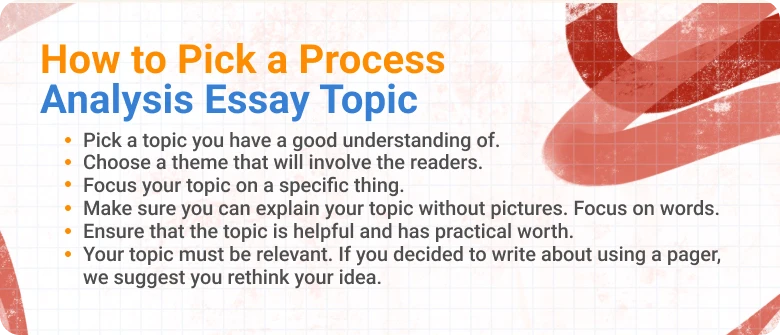
Another very important thing to consider while writing a process essay is your audience. It is highly unlikely that college students are interested in instructions for “How to Get Into Your Dream School” or “How to Pass Your SATs”. Make sure your topic relates to the subject you are studying and you are following your professor’s prompt guidelines.
Here are some ideas that might be of interest for you:
- How to lose weight on a keto diet
- How your immune system fights COVID-19
- How to start selling on Amazon
- How to improve your credit score
- How to decrease your social media usage
- How to apply for unemployment insurance
- How to improve your college performance
- How to open your first bank account
It's important to note that these essay topics are just some common examples used by several college students for their course papers. Feel free to use any one of them if you want, or think of one on your own. Just make sure it's a PROCESS!
Process Essay Outline
Most essay outlines follow the standard scheme: Intro > Body Paragraphs > Conclusion . follow the standard scheme: Intro > Body Paragraphs > Conclusion. A good process essay outline should look like this:
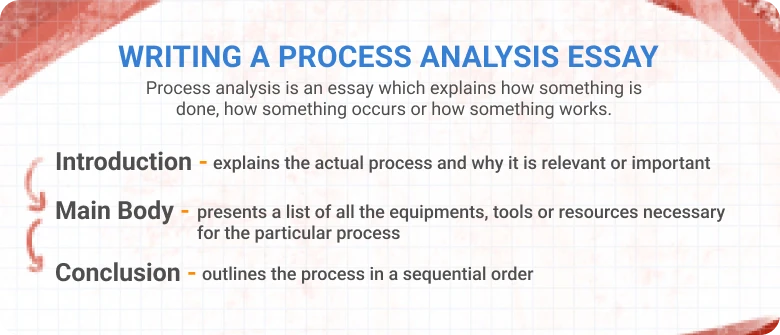
- Introduction — brief your reader on your topic, explain why you have chosen it and how you are planning to approach the explanation of the process.
- Body — the biggest part of your essay that should be divided into paragraphs for easier understanding and structure. Make sure each paragraph is flowing smoothly into the next one with connective words.
Paragraph 1. First step of the process. Explain what the step is, what the best way to perform it is, and how to avoid common mistakes when doing it.
Paragraph 2. The next step of the process (the same as in Paragraph 1). Thoroughly explain what this step is about.
- Conclusion . Here you need to explain why your instructions are valuable. It is your opportunity to persuade your reader(s) that the steps you presented and the process they learned will be useful for them in the future.
Every process is different: some can take a couple of minutes, while others can take months or years to complete. The length of the essay is generally based on the difficulty and number of steps it takes. However, the structure doesn't maneuver.
Introduction
The first thing that you want to do as a writer for your process paper is to help your readers be interested in your individual process. Be descriptive about it, paint a picture for your readers. A joke or a personal reference can be a great attention grabber and can pull your reader right in. For somebody to be keen on approaching your process, they have to express interest in it. Though, it generally goes without saying that many writers ignore this fact. Let's break it down into subsections:
- Give a little bit of historical background. People often want to know the origins of whatever it is that they're working on. Introducing this part of the process helps to intrigue your readers, as well as give them a sense of purpose for the task.
- Create an approximate timeframe. Unfortunately, your readers don't have all day to spend on this one event. In addition to learning about its purpose, people want to know how long the task will take. This way, they can decide how to break up the work. If it's a quick fix, then they can knock it out in one session. However, if it's a large-scale operation, then your readers will obviously have to create their own time schedule.
For example, let’s say that the topic of your essay is “How to Save Money”. You can start the introduction of your process essay by explaining that as a college student, you often find yourself in need of extra money and you are stuck with bad money habits. This will create a good connection with your readers, because almost everyone has been in a situation of needing to be savvy with their finances. Another thing you can mention is the importance of saving money and the multiple opportunities it presents, such as being able to invest it, being able to pay off a credit card debt, or being able to save up to avoid taking out a student loan.
Feeling Overloaded and Stressed?
Our professional writers are ready to help you 24/7!
Body Paragraphs
This is the point in the process essay where you start introducing the step-by-step process your readers will need to take. A lot of the time, it helps to break down each process into subsections. For example, if a step has many parts to it, it would be clever to create a paragraph on its own just for that step. Remember, it's important to keep things smooth and efficient. Break down the body paragraphs in unity with the steps. Let's go into more detail about each step:
Each step should be carefully explained. Every step will vary in length. Think about it: every instruction manual has several steps. Some are more difficult to comprehend or perform than others. For this reason, create your steps and explanations accordingly. You should be able to get a sense of their length and difficulty based on the explanation.
Don't forget to explain the purpose. People don't want orders barked at them aimlessly. Besides just accomplishing a task, people want to learn as they perform.
- Why did they do this?
- What was the purpose of this method?
- Why did we do it this way and not this other way?
To make everything flow smoothly use transitions. Make the steps flow one after another to create a well-structured essay. As you introduce the next step, consider using transition words like “next”, “now”, “then”, “so that”, etc.
Before writing the steps out in full sentences, it is a great idea to create an outline for your body paragraphs. Here is an outline for the body paragraphs of a process essay on “How to Save Money”:
Paragraph 1:
- keep track of your expenses
- organize your collected data
- decide what you can skimp on in your spendings
Paragraph 2:
- create a realistic budget
- check weekly to ensure you are sticking to it
- save 15% of every monthly income
- set a tangible goal for saving, such as a car
These process essay examples use only two body paragraphs, but feel free to include more to ensure a better understanding and cohesive flow for your paper. Although, do not include excessive unnecessary details that clutter your essay and make understanding it even more difficult. While writing your essay, include small brief explanations for each statement. For example, “Even though eating out and grabbing a coffee on your way to class sounds tempting, setting a budget and saving 15% of each of your monthly earnings aside can help you have enough to put down a downpayment on a new car.” Here the reader will understand that there is a direct relationship between each step and the result it is going to give.
Showing the readers that they are learning and not just repeating is one of the most effective ways to lock down their attention and keep them coming back!
After going through every step meticulously and explaining the whole process, a process essay needs a confident conclusion. This paragraph should be short, sweet, and to the point. It's main goal is to accomplish the following tasks:
- Discuss the main result. After the readers have completed the process, they should be left with a final result. It's important that you explain to your readers what the end result will look like, and what can be done with it.
- Restate the process’s general purpose. After completing the task, you obviously would like to know its overall purpose. When your readers feel that they have accomplished a challenge, learned something from it, and have a path to take the result towards, they will be satisfied!
- State your Overall Conclusion. To put a pretty tie around your process essay means that you need to neatly wrap things up! Restate some of the highlightable points as well as the process’s key overall purpose. Make sure that your readers feel accomplished after going through your process, and ensure that you strengthen the necessity of its purpose with a nice concluding sentence!
The conclusion of an essay on “How to Save Money” would explain that the completion of all of the steps will result in saving money that can be used for a specific goal or for rainy day fund purposes. You can mention the importance of every step and briefly repeat some of the key points.
Post-Writing Tips
Here are some final tips to wrap up your writing process. Use them as a checklist for a successful and coherent essay.
- Make sure the work is simple enough to follow. Worst-case-scenario: its author creates a feeling of absolute confusion in the reader’s mind. To avoid this problem, always remember that your readers can be beginners. Do not try to impress them with complicated words or sentences, use simple language to provide clear directions on how to do something. Give as many details as possible, but do it plainly. "Why is he making me do this?" "What was the purpose of this?" "I don't understand this step at all!" If the reader is asking themself these questions, then it's time to do some editing!
- Experiment and try it for yourself or ask a friend. There's no better way to experience success than to actively attempt your process through your own instructions. If everything truly makes sense, then you should have no problem solving the task using your own words. Even better, ask a peer to try it through your words to get an outside point of view.
- Choose the right topic for you and research it well
- Maintain a logical order of steps, make it easy to follow
- Avoid using imperative sentences - you do not want to sound like an Apple TV manual
- Explain terms that are most likely outside of most people’s range of common knowledge
If you have a ready-made essay but need to make significant changes to it, you can use our rewrite my essay service .
Process Essay Examples
Now that you know all about process essays and how to write them, we have prepared some great essay topic ideas in case you are stuck and cannot choose one:
Building a business from scratch is an intricate process that entails a number of steps. Each of these steps should have specific objectives and measurable outcomes.The following analysis gives the basic steps followed when building any business from scratch.
Saving can be defined as a differed consumption or keeping aside a portion of your income for unexpected future uncertainties or plans. Read for reason and actual steps for saving more money
Read also a thesis statement example from our author. In this article, you can learn something useful for yourself.
Still Need Help?
If you still feel like you could use some help with your process essay, do not hesitate to seek help from our writing service. Our writers specialize in a wide range of essays of different types including creative writing essay , process essays, and would be more than happy to assist you with writing, editing, or direction if you are feeling uneasy. Click the button below and college admission essay writer will process your requests fast.
Related Articles
.webp)
Purdue Online Writing Lab Purdue OWL® College of Liberal Arts
The Writing Process

Welcome to the Purdue OWL
This page is brought to you by the OWL at Purdue University. When printing this page, you must include the entire legal notice.
Copyright ©1995-2018 by The Writing Lab & The OWL at Purdue and Purdue University. All rights reserved. This material may not be published, reproduced, broadcast, rewritten, or redistributed without permission. Use of this site constitutes acceptance of our terms and conditions of fair use.
In this section
Subsections.
- Enroll & Pay
- Prospective Students
- Current Students
- Degree Programs
The Writing Process
The writing process is something that no two people do the same way. There is no "right way" or "wrong way" to write. It can be a very messy and fluid process, and the following is only a representation of commonly used steps. Remember you can come to the Writing Center for assistance at any stage in this process.
Steps of the Writing Process
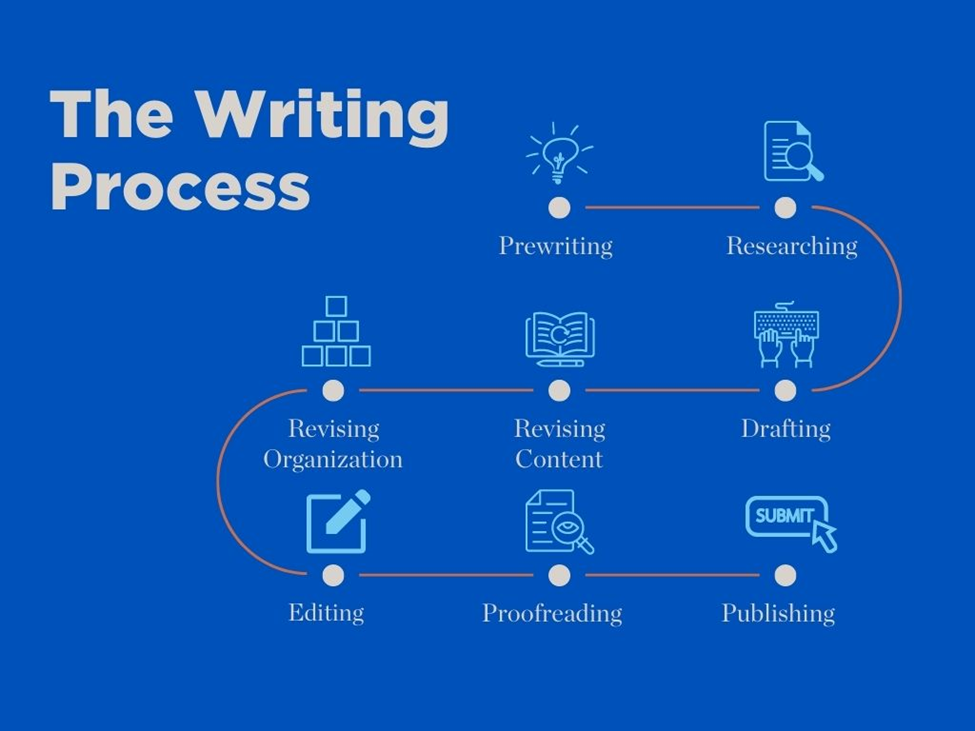
Step 1: Prewriting
Think and Decide
- Make sure you understand your assignment. See Research Papers or Essays
- Decide on a topic to write about. See Prewriting Strategies and Narrow your Topic
- Consider who will read your work. See Audience and Voice
- Brainstorm ideas about the subject and how those ideas can be organized. Make an outline. See Outlines
Step 2: Research (if needed)
- List places where you can find information.
- Do your research. See the many KU Libraries resources and helpful guides
- Evaluate your sources. See Evaluating Sources and Primary vs. Secondary Sources
- Make an outline to help organize your research. See Outlines
Step 3: Drafting
- Write sentences and paragraphs even if they are not perfect.
- Create a thesis statement with your main idea. See Thesis Statements
- Put the information you researched into your essay accurately without plagiarizing. Remember to include both in-text citations and a bibliographic page. See Incorporating References and Paraphrase and Summary
- Read what you have written and judge if it says what you mean. Write some more.
- Read it again.
- Write some more.
- Write until you have said everything you want to say about the topic.
Step 4: Revising
Make it Better
- Read what you have written again. See Revising Content and Revising Organization
- Rearrange words, sentences, or paragraphs into a clear and logical order.
- Take out or add parts.
- Do more research if you think you should.
- Replace overused or unclear words.
- Read your writing aloud to be sure it flows smoothly. Add transitions.
Step 5: Editing and Proofreading
Make it Correct
- Be sure all sentences are complete. See Editing and Proofreading
- Correct spelling, capitalization, and punctuation.
- Change words that are not used correctly or are unclear.
- APA Formatting
- Chicago Style Formatting
- MLA Formatting
- Have someone else check your work.
How to Write a Process Essay?
18 June, 2020
14 minutes read
Author: Tomas White
What is a “process essay”? What makes it different from dozens of other papers you create on a daily basis? What are its main components and what the main goal of this type of writing you need to bear in mind? If you're looking for answers to these questions, you're in luck! You can get them all from our academic guide on how to write a process essay.

Composing a process essay can be rather complicated especially if you are not familiar with this type of writing and do not know what pitfalls and specifications to pay attention to.
That is why our custom essay writing service has created this guide to help you tackle this task. We will answer all these questions in our article below and even provide you with great process essay examples and topics you can write on to stand out. So, if that sounds like something you need right now, read on: we are here to help and equip you with knowledge!
But first things first. Since it is impossible to create an excellent process essay without crystal clear understanding of the term, we will start with the definition. So, let’s dive in!
What is a process essay?
A process essay is commonly written either to explain how something works or to guide a reader through the process of completing a particular task, states the process essay definition.
Process essays also go under the “How-to articles” title and aim to teach the target audience how to achieve certain goals or complete specific assignments.
So, look at it like this. In case of “How to quit smoking” process essay, your primary goal is to provide several helpful ways of quitting this habit. These might be evidence-based recommendations if you have experience in this area, or simply common sense ideas you found while conducting your research.
Now that you realize what you will be working with, let’s look into different types of process essays and practical ways to compose them. Our essay writing guide will walk you through the process essay writing step by step.
Types of process essays
There are two main types of such papers: the ones that explain how something works , and those that show you how to complete a particular task .
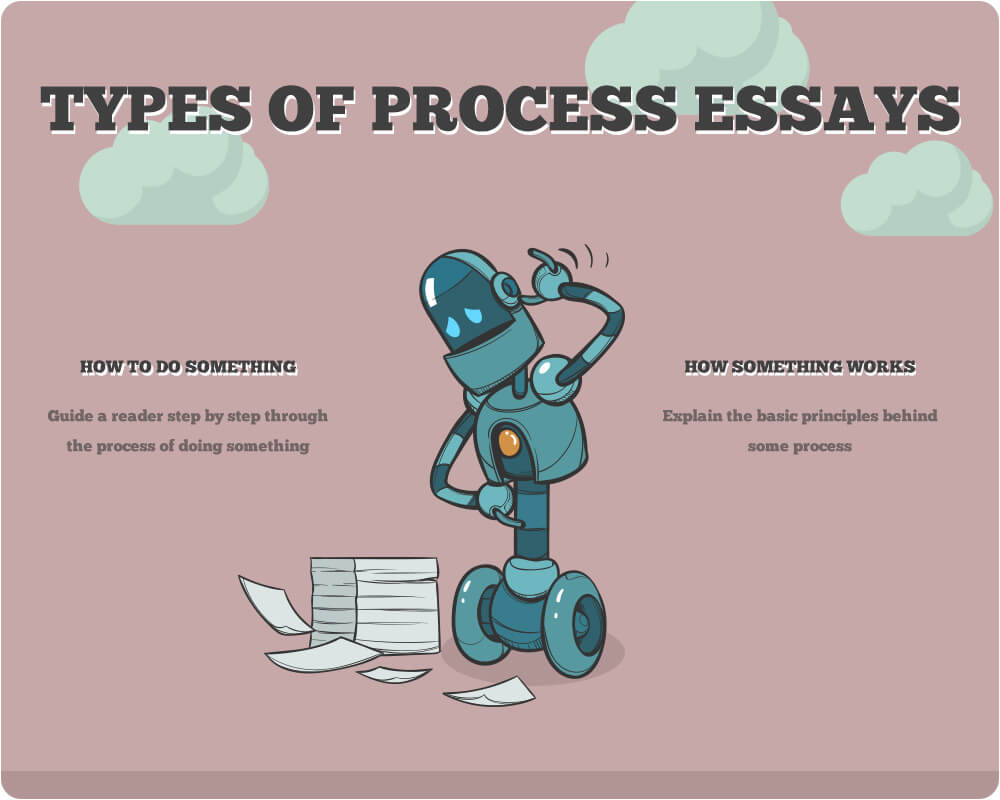
1. How to do something.
Though it sounds quite self-explanatory, we’d like to emphasize the importance of clear instructions in case you are writing a process essay.
Your readers must be able to follow your guidance and complete each step successfully. So, split the process into small steps, keep it short and to the point at each stage of crafting a process essay.
For instance, in a “How to quit smoking” process essay , you can split the whole process into seven steps:
- Choose a date for a quit day;
- Imagine life without cigarettes and expect it;
- Have one last cigarette as a “Goodbye!”;
- Be among people to support you;
- Keep your goal in perspective not to give up;
- Don’t fall for substitutes;
- Be accountable.
2. How something works.
By contrast, this is an informative type of writing that aims to achieve one goal – explain the principle of work behind some process. Unlike the mentioned above type, this process essay type does not encourage a reader to take an action and do something step by step.
However, you must make sure that by the end of your essay, the audience will know for sure how something functions.
As an example of this type of a process essay, let’s see how an earthquake happens .
- First, the energy within the earth core builds up due to various moves in the earth crust;
- The energy level grows up and causes tension in the tectonic plates;
- After some time, the pressure radiates outwards by moving the plates from each other;
- The seismic waves shake the earth as they get from the core of the earth to the surface;
- That is when the earthquake takes place.
Before we go any further, let’s look at another example. In case of “How to prepare for a vacation” process essay, your task is to compose a few steps that your readers can take when getting ready for their vacation. In other words, you are describing how to do something.
Meanwhile, “What happens to your brain when you sleep” process essay is merely an explanation of the principle. In it, you are not encouraging readers to take any actions whatsoever. So, here is the fundamental difference.
How to write a process essay?
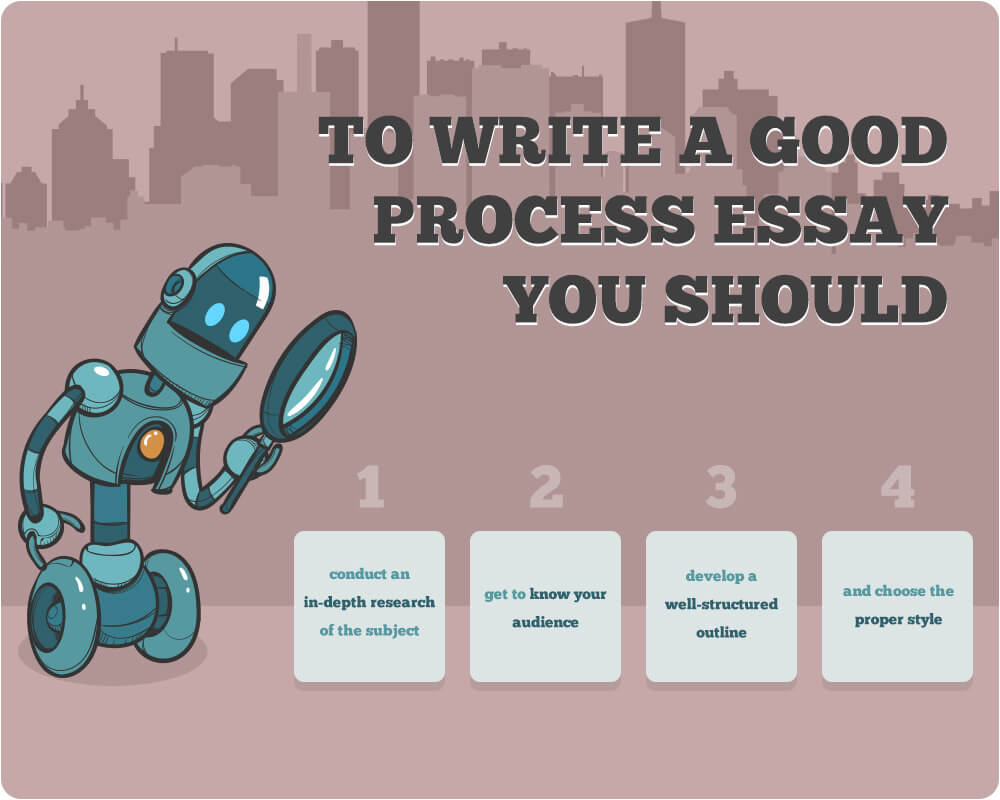
Getting started with process essay writing
When developing a process essay outline, take some time to answer the following questions:
- Who is your target audience? How deep is their knowledge of the subject? The complexity of your essay depends on their skills level. Thus, for instance, when explaining to your peers how to stretch a dollar to see the world, you can use basic terminology and examples they can relate to. However, your vocabulary should be way more sophisticated if you are writing a process essay on how to improve the overall quality of higher education in your state to the City Council.
- How can you divide the process into small steps? You do not want to bore your audience to death with unnecessary details in a process essay. Yet, you cannot afford to skip valuable steps if they are crucial to the overall understanding of the subject of your process essay. So, try to find the golden cut and figure out the most suitable amount of steps.
- What sources will you use for the task? It goes without saying that you can only use reliable sources to support your argument in a process essay. These sources should be all mentioned in the end of your essay. And remember about proper in-text citation styles. Read the materials carefully and take only the information that will add value to your essay and helps make it shine.
How to write a process essay outline
Finally, let’s look into the process essay structure. Needless to say that you must start with something that will grab readers’ attention, or in other words, “a hook.”
It is true for any essay, and process essay writing is not an exception.
The structure of your essay regardless of the process essay topics should consist of:
- A powerful introduction.
- Main body paragraphs.
- An interesting conclusion.
Related Post: Essay outline | Research Paper outline
Sounds simple, yet there are several things you should not forget about process essay writing.
How to write an introduction to a process essay
Once you compose a hook, mention why you believe that readers should use your approach to solve a problem even though there are dozens of other ones. We know two effective ways to achieve this in your process essay:
- Show how much time this task will take . People don’t have all the time in the world to tackle just this one task. So, you’ll really help them by stating how much time completing something using your approach will take and underline that with your approach described in a process essay it will take less time than if they opt for a different one. “Writing can be tough, especially if you always felt that it is not exactly your suit. However, Michael D. Pollock, a credible expert in this area, has recently presented 10 effective tips that will help you learn writing fast and make you able to craft a 1000-word article in 30 minutes. So, keep reading to find out how you can write this fast too.”
- Introduce your audience to the historical background of the approach (if any) you’re using in a process essay. Let them see the roots of your solution. Here is what a good introduction of a process essay should look like: “Giving a speech with lots of eyes concentrated on you is not an easy task. No wonder so many students dread this task. However, speech can be a powerful tool, and we can teach you how to give them right. Steve Jobs is known as one of the best public speakers of our time. People were sitting on the edge of their seats when he spoke. And we’ll teach you how to grab attention like he did using just five simple tricks he applied.”
At last, compose an engaging thesis of a process essay. Many students consider it a scary part. But it all goes down to this.
Your thesis statement should reason why your way is the best and why readers looking for answers should search no more and give your solution a chance.
It’s easier than you think. Here is a good thesis statement example:
“With more than 580 million tons of household waste produced all over the world, Every tiny effort you make to become eco-friendly counts. And if you don’t want to spend extra money on sustainable products but want to save the environment, use our guide on ten simple eco-friendly steps you can do daily without even noticing it!”
This is what a thesis statement for a process essay on how to be eco-friendly would look like. Yours can be different, but you get the idea!
How to plan main body paragraphs
- Dedicate one body paragraph to one point you want to bring to light.
- Provide enough details on each step including the ultimate goal of this step and reasons why this method was chosen for its achievement.
- Keep it short and to the point.
How to write a conclusion
Now is that time you reminded the readers about the purpose of a process essay, reasons why you chose this particular approach, and briefly mentioned steps needed to accomplish the task.
Besides, you can call your audience to action but only in case you are writing an essay that shows how to do something. Otherwise, it will be inapplicable.
Finally, help them set their expectations right: what results can they count on in the end? How long will it take them to achieve those results after reading your process essay and applying its tips?
How to use transition words in a process essay
Transition words can help you create a seamless reading experience. You can take readers smoothly from one step to another. And what is more you can help them immerse into the process!
Therefore, begin each new paragraph with a transition word, add one in between examples you provide, and summarize your instructions with them, too.
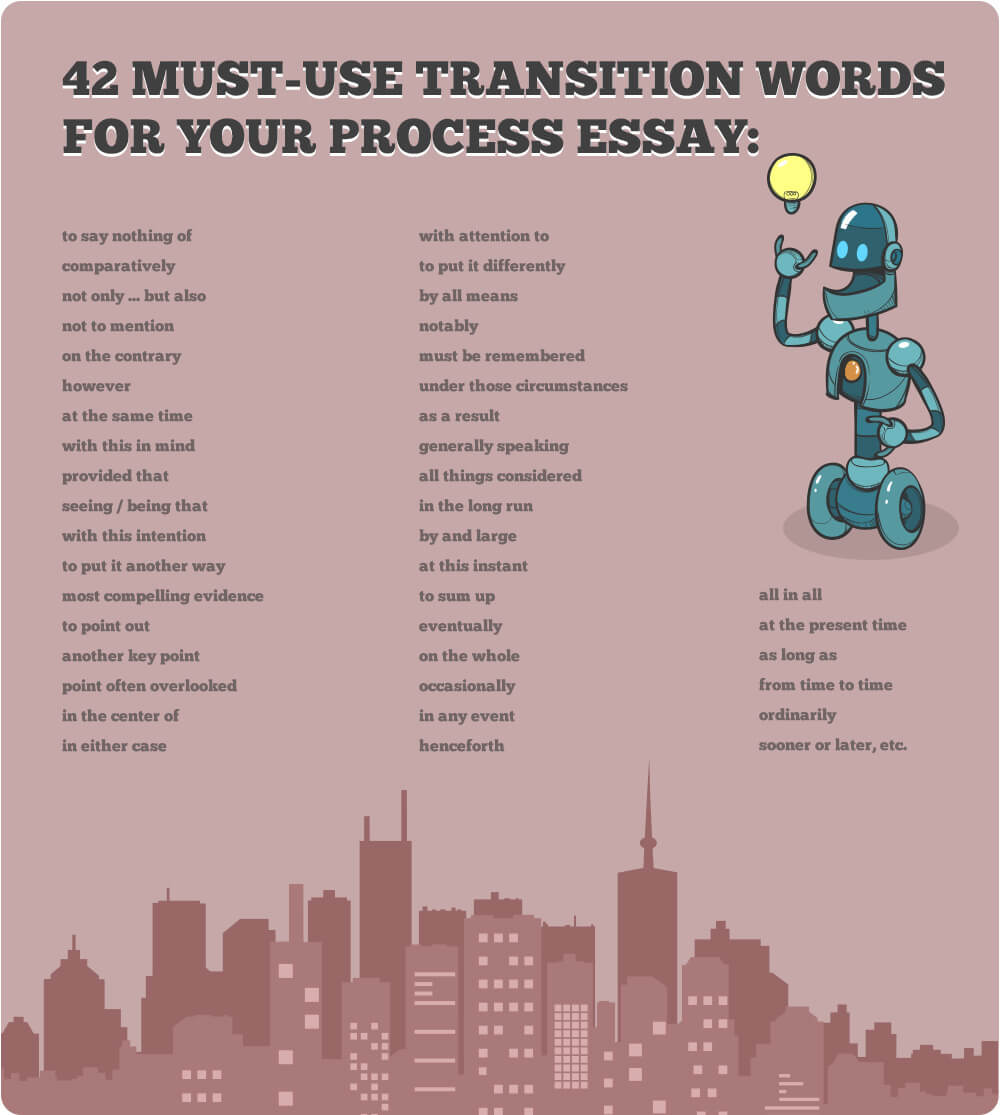
Think of transition words as of bridges that connect paragraphs and sentences. They make smooth communication between the two possible. And with them in your process essay, no reader feels irritated or frustrated with your writing style, as they have to stumble upon every other sentence in your piece.
Good process essay topics
It is not enough to just know the theory to create a good process essay. One should also come up with a topic that will be both interesting and useful to his readers. Here’s a list of our suggestions on process essay ideas:
- How to choose a perfect future career.
- How to survive college and stay sane.
- How to eat healthy on campus.
- How to balance your social and academic life.
- How to pay out a student loan while still at college.
- How to improve your public speaking skills.
- How to see the world with only $100 in your pocket.
- How to learn a foreign language.
- How to renovate your apartment and not go bankrupt.
- How to start your own business.
- How to prepare for your first interview.
- How to get volunteers to help you clean the neighborhood.
- How to write a life list.
- How to set boundaries in the relationship.
- How to study overseas for free.
Related Posts: Argumentative essay topics | Compare&Contrast essay topics
Process essay writing tips
Wrapping up, we would like to introduce you to a couple of vital recommendations on process essay writing:
- Your process essay subject cannot be too broad or too narrow. Look out for the golden cut!
- Introduce your readers to possible complications of the process. After all, forewarned is forearmed.
- Create a short vocabulary your audience can use in case they are not familiar with the terminology essential to the general understanding of the process essay in question.
- Develop a list of resources your readers will need as they deal with certain tasks. This way you will have them prepared to put your recommendations to action right away.
- Always write a process essay using Active Voice!
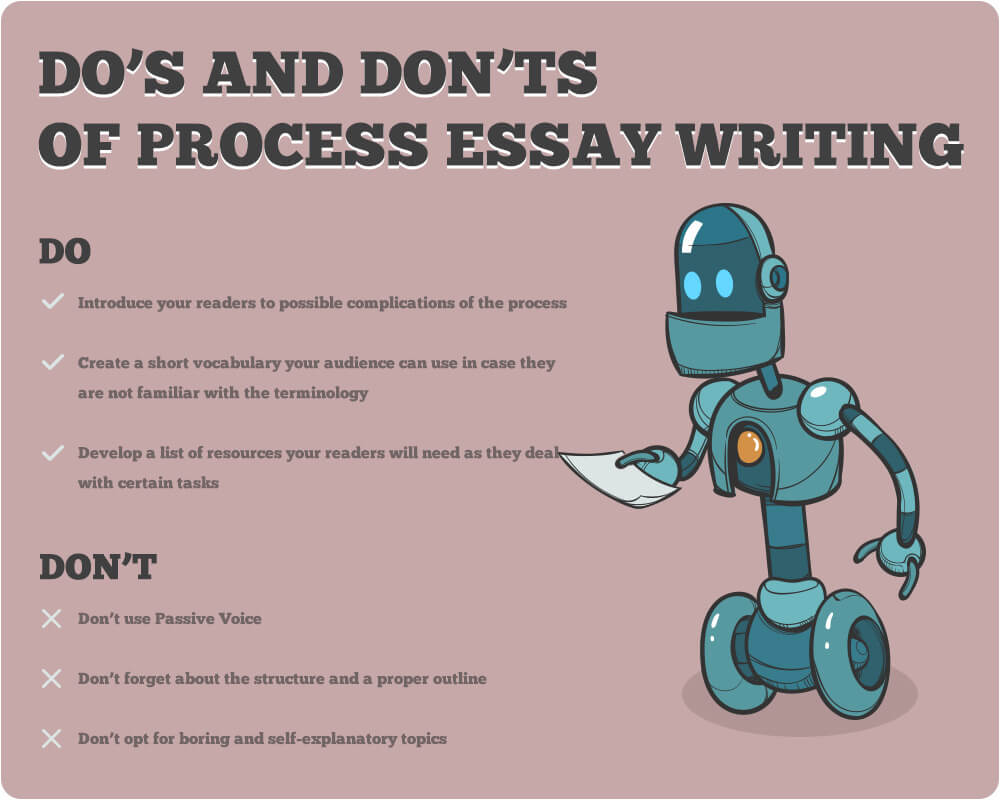
Need help with your process essay writing? Handmadewriting is here for you to help. Drop us a line to get our professional essay writers to develop an excellent piece for you!

A life lesson in Romeo and Juliet taught by death
Due to human nature, we draw conclusions only when life gives us a lesson since the experience of others is not so effective and powerful. Therefore, when analyzing and sorting out common problems we face, we may trace a parallel with well-known book characters or real historical figures. Moreover, we often compare our situations with […]

Ethical Research Paper Topics
Writing a research paper on ethics is not an easy task, especially if you do not possess excellent writing skills and do not like to contemplate controversial questions. But an ethics course is obligatory in all higher education institutions, and students have to look for a way out and be creative. When you find an […]

Art Research Paper Topics
Students obtaining degrees in fine art and art & design programs most commonly need to write a paper on art topics. However, this subject is becoming more popular in educational institutions for expanding students’ horizons. Thus, both groups of receivers of education: those who are into arts and those who only get acquainted with art […]
Table of Contents
Ai, ethics & human agency, collaboration, information literacy, writing process, the ultimate blueprint: a research-driven deep dive into the 13 steps of the writing process.
- © 2023 by Joseph M. Moxley - University of South Florida
This article provides a comprehensive, research-based introduction to the major steps , or strategies , that writers work through as they endeavor to communicate with audiences . Since the 1960s, the writing process has been defined to be a series of steps , stages, or strategies. Most simply, the writing process is conceptualized as four major steps: prewriting , drafting , revising , editing . That model works really well for many occasions. Yet sometimes you'll face really challenging writing tasks that will force you to engage in additional steps, including, prewriting , inventing , drafting , collaborating , researching , planning , organizing , designing , rereading , revising , editing , proofreading , sharing or publishing . Expand your composing repertoire -- your ability to respond with authority , clarity , and persuasiveness -- by learning about the dispositions and strategies of successful, professional writers.

Like water cascading to the sea, flow feels inevitable, natural, purposeful. Yet achieving flow is a state of mind that can be difficult to achieve. It requires full commitment to the believing gam e (as opposed to the doubting game ).
What are the Steps of the Writing Process?
Since the 1960s, it has been popular to describe the writing process as a series of steps or stages . For simple projects, the writing process is typically defined as four major steps:
- drafting
This simplified approach to writing is quite appropriate for many exigencies–many calls to write . Often, e.g., we might read an email quickly, write a response, and then send it: write, revise, send.
However, in the real world, for more demanding projects — especially in high-stakes workplace writing or academic writing at the high school and college level — the writing process involve additional steps, or strategies , such as
- collaboration
- researching
- proofreading
- sharing or publishing.
Related Concepts: Mindset ; Self Regulation
Summary – Writing Process Steps
The summary below outlines the major steps writers work through as they endeavor to develop an idea for an audience .
1. Prewriting
Prewriting refers to all the work a writer does on a writing project before they actually begin writing .
Acts of prewriting include
- Prior to writing a first draft, analyze the context for the work. For instance, in school settings students may analyze how much of their grade will be determined by a particular assignment. They may question how many and what sources are required and what the grading criteria will be used for critiquing the work.
- To further their understanding of the assignment, writers will question who the audience is for their work, what their purpose is for writing, what style of writing their audience expects them to employ, and what rhetorical stance is appropriate for them to develop given the rhetorical situation they are addressing. (See the document planner heuristic for more on this)
- consider employing rhetorical appeals ( ethos , pathos , and logos ), rhetorical devices , and rhetorical modes they want to develop once they begin writing
- reflect on the voice , tone , and persona they want to develop
- Following rhetorical analysis and rhetorical reasoning , writers decide on the persona ; point of view ; tone , voice and style of writing they hope to develop, such as an academic writing prose style or a professional writing prose style
- making a plan, an outline, for what to do next.
2. Invention
Invention is traditionally defined as an initial stage of the writing process when writers are more focused on discovery and creative play. During the early stages of a project, writers brainstorm; they explore various topics and perspectives before committing to a specific direction for their discourse .
In practice, invention can be an ongoing concern throughout the writing process. People who are focused on solving problems and developing original ideas, arguments , artifacts, products, services, applications, and texts are open to acts of invention at any time during the writing process.
Writers have many different ways to engage in acts of invention, including
- What is the exigency, the call to write ?
- What are the ongoing scholarly debates in the peer-review literature?
- What is the problem ?
- What do they read? watch? say? What do they know about the topic? Why do they believe what they do? What are their beliefs, values, and expectations ?
- What rhetorical appeals — ethos (credibility) , pathos (emotion) , and logos (logic) — should I explore to develop the best response to this exigency , this call to write?
- What does peer-reviewed research say about the subject?
- What are the current debates about the subject?
- Embrace multiple viewpoints and consider various approaches to encourage the generation of original ideas.
- How can I experiment with different media , genres , writing styles , personas , voices , tone
- Experiment with new research methods
- Write whatever ideas occur to you. Focus on generating ideas as opposed to writing grammatically correct sentences. Get your thoughts down as fully and quickly as you can without critiquing them.
- Use heuristics to inspire discovery and creative thinking: Burke’s Pentad ; Document Planner , Journalistic Questions , The Business Model Canvas
- Embrace the uncertainty that comes with creative exploration.
- Listen to your intuition — your felt sense — when composing
- Experiment with different writing styles , genres , writing tools, and rhetorical stances
- Play the believing game early in the writing process
3. Researching
Research refers to systematic investigations that investigators carry out to discover new knowledge , test knowledge claims , solve problems , or develop new texts , products, apps, and services.
During the research stage of the writing process, writers may engage in
- Engage in customer discovery interviews and survey research in order to better understand the problem space . Use surveys , interviews, focus groups, etc., to understand the stakeholder’s s (e.g., clients, suppliers, partners) problems and needs
- What can you recall from your memory about the subject?
- What can you learn from informal observation?
- What can you learn from strategic searching of the archive on the topic that interests you?
- Who are the thought leaders?
- What were the major turns to the conversation ?
- What are the current debates on the topic ?
- Mixed research methods , qualitative research methods , quantitative research methods , usability and user experience research ?
- What citation style is required by the audience and discourse community you’re addressing? APA | MLA .
4. Collaboration
Collaboration refers to the act of working with others to exchange ideas, solve problems, investigate subjects , coauthor texts , and develop products and services.
Collaboration can play a major role in the writing process, especially when authors coauthor documents with peers and teams , or critique the works of others .
Acts of collaboration include
- Paying close attention to what others are saying, acknowledging their input, and asking clarifying questions to ensure understanding.
- Expressing ideas, thoughts, and opinions in a concise and understandable manner, both verbally and in writing.
- Being receptive to new ideas and perspectives, and considering alternative approaches to problem-solving.
- Adapting to changes in project goals, timelines, or team dynamics, and being willing to modify plans when needed.
- Distributing tasks and responsibilities fairly among team members, and holding oneself accountable for assigned work.
- valuing and appreciating the unique backgrounds, skills, and perspectives of all team members, and leveraging this diversity to enhance collaboration.
- Addressing disagreements or conflicts constructively and diplomatically, working towards mutually beneficial solutions.
- Providing constructive feedback to help others improve their work, and being open to receiving feedback to refine one’s own ideas and contributions.
- Understanding and responding to the emotions, needs, and concerns of team members, and fostering a supportive and inclusive environment .
- Acknowledging and appreciating the achievements of the team and individual members, and using successes as a foundation for continued collaboration and growth.
5. Planning
Planning refers to
- the process of planning how to organize a document
- the process of managing your writing processes
6. Organizing
Following rhetorical analysis , following prewriting , writers question how they should organize their texts. For instance, should they adopt the organizational strategies of academic discourse or workplace-writing discourse ?
Writing-Process Plans
- What is your Purpose? – Aims of Discourse
- What steps, or strategies, need to be completed next?
- set a schedule to complete goals
Planning Exercises
- Document Planner
- Team Charter
7. Designing
Designing refers to efforts on the part of the writer
- to leverage the power of visual language to convey meaning
- to create a visually appealing text
During the designing stage of the writing process, writers explore how they can use the elements of design and visual language to signify , clarify , and simplify the message.
Examples of the designing step of the writing process:
- Establishing a clear hierarchy of visual elements, such as headings, subheadings, and bullet points, to guide the reader’s attention and facilitate understanding.
- Selecting appropriate fonts, sizes, and styles to ensure readability and convey the intended tone and emphasis.
- Organizing text and visual elements on the page or screen in a manner that is visually appealing, easy to navigate, and supports the intended message.
- Using color schemes and contrasts effectively to create a visually engaging experience, while also ensuring readability and accessibility for all readers.
- Incorporating images, illustrations, charts, graphs, and videos to support and enrich the written content, and to convey complex ideas in a more accessible format.
- Designing content that is easily accessible to a wide range of readers, including those with visual impairments, by adhering to accessibility guidelines and best practices.
- Maintaining a consistent style and design throughout the text, which includes the use of visuals, formatting, and typography, to create a cohesive and professional appearance.
- Integrating interactive elements, such as hyperlinks, buttons, and multimedia, to encourage reader engagement and foster deeper understanding of the content.
8. Drafting
Drafting refers to the act of writing a preliminary version of a document — a sloppy first draft. Writers engage in exploratory writing early in the writing process. During drafting, writers focus on freewriting: they write in short bursts of writing without stopping and without concern for grammatical correctness or stylistic matters.
When composing, writers move back and forth between drafting new material, revising drafts, and other steps in the writing process.
9. Rereading
Rereading refers to the process of carefully reviewing a written text. When writers reread texts, they look in between each word, phrase, sentence, paragraph. They look for gaps in content, reasoning, organization, design, diction, style–and more.
When engaged in the physical act of writing — during moments of composing — writers will often pause from drafting to reread what they wrote or to reread some other text they are referencing.
10. Revising
Revision — the process of revisiting, rethinking, and refining written work to improve its content , clarity and overall effectiveness — is such an important part of the writing process that experienced writers often say “writing is revision” or “all writing is revision.”
For many writers, revision processes are deeply intertwined with writing, invention, and reasoning strategies:
- “Writing and rewriting are a constant search for what one is saying.” — John Updike
- “How do I know what I think until I see what I say.” — E.M. Forster
Acts of revision include
- Pivoting: trashing earlier work and moving in a new direction
- Identifying Rhetorical Problems
- Identifying Structural Problems
- Identifying Language Problems
- Identifying Critical & Analytical Thinking Problems
11. Editing
Editing refers to the act of critically reviewing a text with the goal of identifying and rectifying sentence and word-level problems.
When editing , writers tend to focus on local concerns as opposed to global concerns . For instance, they may look for
- problems weaving sources into your argument or analysis
- problems establishing the authority of sources
- problems using the required citation style
- mechanical errors ( capitalization , punctuation , spelling )
- sentence errors , sentence structure errors
- problems with diction , brevity , clarity , flow , inclusivity , register, and simplicity
12. Proofreading
Proofreading refers to last time you’ll look at a document before sharing or publishing the work with its intended audience(s). At this point in the writing process, it’s too late to add in some new evidence you’ve found to support your position. Now you don’t want to add any new content. Instead, your goal during proofreading is to do a final check on word-level errors, problems with diction , punctuation , or syntax.
13. Sharing or Publishing
Sharing refers to the last step in the writing process: the moment when the writer delivers the message — the text — to the target audience .
Writers may think it makes sense to wait to share their work later in the process, after the project is fairly complete. However, that’s not always the case. Sometimes you can save yourself a lot of trouble by bringing in collaborators and critics earlier in the writing process.
Doherty, M. (2016, September 4). 10 things you need to know about banyan trees. Under the Banyan. https://underthebanyan.blog/2016/09/04/10-things-you-need-to-know-about-banyan-trees/
Emig, J. (1967). On teaching composition: Some hypotheses as definitions. Research in The Teaching of English, 1(2), 127-135. Retrieved from http://files.eric.ed.gov/fulltext/ED022783.pdf
Emig, J. (1971). The composing processes of twelfth graders (Research Report No. 13). Urbana, IL: National Council of Teachers of English.
Emig, J. (1983). The web of meaning: Essays on writing, teaching, learning and thinking. Upper Montclair, NJ: Boynton/Cook Publishers, Inc.
Ghiselin, B. (Ed.). (1985). The Creative Process: Reflections on the Invention in the Arts and Sciences . University of California Press.
Hayes, J. R., & Flower, L. (1980). Identifying the Organization of Writing Processes. In L. W. Gregg, & E. R. Steinberg (Eds.), Cognitive Processes in Writing: An Interdisciplinary Approach (pp. 3-30). Hillsdale, NJ: Lawrence Erlbaum.
Hayes, J. R. (2012). Modeling and remodeling writing. Written Communication, 29(3), 369-388. https://doi: 10.1177/0741088312451260
Hayes, J. R., & Flower, L. S. (1986). Writing research and the writer. American Psychologist, 41(10), 1106-1113. https://doi.org/10.1037/0003-066X.41.10.1106
Leijten, Van Waes, L., Schriver, K., & Hayes, J. R. (2014). Writing in the workplace: Constructing documents using multiple digital sources. Journal of Writing Research, 5(3), 285–337. https://doi.org/10.17239/jowr-2014.05.03.3
Lundstrom, K., Babcock, R. D., & McAlister, K. (2023). Collaboration in writing: Examining the role of experience in successful team writing projects. Journal of Writing Research, 15(1), 89-115. https://doi.org/10.17239/jowr-2023.15.01.05
National Research Council. (2012). Education for Life and Work: Developing Transferable Knowledge and Skills in the 21st Century . Washington, DC: The National Academies Press.https://doi.org/10.17226/13398.
North, S. M. (1987). The making of knowledge in composition: Portrait of an emerging field. Boynton/Cook Publishers.
Murray, Donald M. (1980). Writing as process: How writing finds its own meaning. In Timothy R. Donovan & Ben McClelland (Eds.), Eight approaches to teaching composition (pp. 3–20). National Council of Teachers of English.
Murray, Donald M. (1972). “Teach Writing as a Process Not Product.” The Leaflet, 11-14
Perry, S. K. (1996). When time stops: How creative writers experience entry into the flow state (Order No. 9805789). Available from ProQuest Dissertations & Theses A&I; ProQuest Dissertations & Theses Global. (304288035). https://www.proquest.com/dissertations-theses/when-time-stops-how-creative-writers-experience/docview/304288035/se-2
Rohman, D.G., & Wlecke, A. O. (1964). Pre-writing: The construction and application of models for concept formation in writing (Cooperative Research Project No. 2174). East Lansing, MI: Michigan State University.
Rohman, D. G., & Wlecke, A. O. (1975). Pre-writing: The construction and application of models for concept formation in writing (Cooperative Research Project No. 2174). U.S. Office of Education, Department of Health, Education, and Welfare.
Sommers, N. (1980). Revision Strategies of Student Writers and Experienced Adult Writers. College Composition and Communication, 31(4), 378-388. doi: 10.2307/356600

Brevity - Say More with Less

Clarity (in Speech and Writing)

Coherence - How to Achieve Coherence in Writing

Flow - How to Create Flow in Writing

Inclusivity - Inclusive Language

The Elements of Style - The DNA of Powerful Writing

Suggested Edits
- Please select the purpose of your message. * - Corrections, Typos, or Edits Technical Support/Problems using the site Advertising with Writing Commons Copyright Issues I am contacting you about something else
- Your full name
- Your email address *
- Page URL needing edits *
- Name This field is for validation purposes and should be left unchanged.

Other Topics:
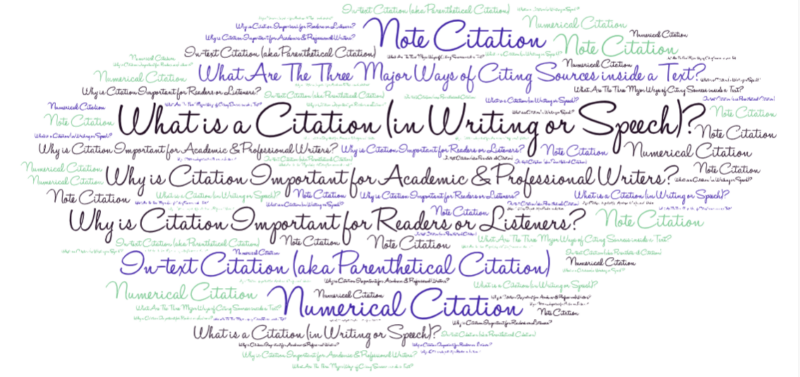
Citation - Definition - Introduction to Citation in Academic & Professional Writing
- Joseph M. Moxley
Explore the different ways to cite sources in academic and professional writing, including in-text (Parenthetical), numerical, and note citations.

Collaboration - What is the Role of Collaboration in Academic & Professional Writing?
Collaboration refers to the act of working with others or AI to solve problems, coauthor texts, and develop products and services. Collaboration is a highly prized workplace competency in academic...

Genre may reference a type of writing, art, or musical composition; socially-agreed upon expectations about how writers and speakers should respond to particular rhetorical situations; the cultural values; the epistemological assumptions...
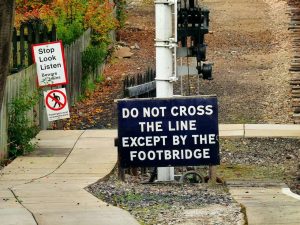
Grammar refers to the rules that inform how people and discourse communities use language (e.g., written or spoken English, body language, or visual language) to communicate. Learn about the rhetorical...

Information Literacy - Discerning Quality Information from Noise
Information Literacy refers to the competencies associated with locating, evaluating, using, and archiving information. In order to thrive, much less survive in a global information economy — an economy where information functions as a...

Mindset refers to a person or community’s way of feeling, thinking, and acting about a topic. The mindsets you hold, consciously or subconsciously, shape how you feel, think, and act–and...

Rhetoric: Exploring Its Definition and Impact on Modern Communication
Learn about rhetoric and rhetorical practices (e.g., rhetorical analysis, rhetorical reasoning, rhetorical situation, and rhetorical stance) so that you can strategically manage how you compose and subsequently produce a text...

Style, most simply, refers to how you say something as opposed to what you say. The style of your writing matters because audiences are unlikely to read your work or...

The Writing Process - Research on Composing
The writing process refers to everything you do in order to complete a writing project. Over the last six decades, researchers have studied and theorized about how writers go about...

Writing Studies
Writing studies refers to an interdisciplinary community of scholars and researchers who study writing. Writing studies also refers to an academic, interdisciplinary discipline – a subject of study. Students in...
Featured Articles

Academic Writing – How to Write for the Academic Community

Professional Writing – How to Write for the Professional World

Authority – How to Establish Credibility in Speech & Writing
50 Great Topics for a Process Analysis Essay
Illustration by Jiaqi Zhou. ThoughtCo.
- Writing Essays
- Writing Research Papers
- English Grammar
- Ph.D., Rhetoric and English, University of Georgia
- M.A., Modern English and American Literature, University of Leicester
- B.A., English, State University of New York
If you've ever read an instruction manual or written a set of directions, then you are probably familiar with process analysis writing. This form of composition is often used in the field of technical writing to explain the process of a complex system logically and objectively. Because the material covered in process analyses can be quite complicated, this type of writing tends to be detailed and long.
What Is Process Analysis Writing?
Process analysis writing involves a comprehensive set of instructions that explains a process from beginning to end. To successfully write a process analysis essay, writers must critically analyze each step of the process they have chosen to describe and determine the most reasonable way of delivering information before writing. Expertise is required when explaining a process with this level of detail and this can be obtained through firsthand experience or thorough research.
The topic of a process analysis essay needs to be as specific as possible and it is crucial that the tone of the essay be clear and straightforward. A writer's main goal when crafting a process analysis essay should be to make a process easy to follow. Below is a set of tips that will help you achieve this.
Tips for Writing a Process Analysis Essay
When writing an essay or speech through process analysis , keep these tips in mind:
- Include all steps and arrange them in chronological order .
- Explain why each step is necessary and include warnings when appropriate.
- Define any terms that may be unfamiliar to readers.
- Offer clear descriptions of any required tools or materials.
- Give your readers a way to measure the success of the finished process.
50 Process Analysis Essay Topics
Writers will have an easier time writing process analysis essays and following the above guidelines for topics they know well. To begin, choose a subject that you enjoy writing about and know that you can explain well. These prompts offer potential process analysis essay topics to get you started.
- How to mow your lawn
- How to win a game of Texas hold 'em poker
- How to lose weight without losing your mind
- How to find the perfect roommate
- How to get rid of a roommate—without committing a crime
- How to achieve academic success in college
- How to pitch a knuckleball in baseball
- How to plan the perfect party
- How to survive a night of babysitting
- How to pitch a tent in the rain
- How to housebreak your dog
- How to kick a bad habit
- How to overcome insomnia
- How to stay sober on a Saturday night
- How to rent your first apartment
- How to avoid a nervous breakdown during exams
- How to enjoy the weekend for less than $20
- How to make the perfect brownies
- How to keep resolve arguments with your spouse
- How to bathe a cat
- How to get what you want through complaining
- How to survive a recession
- How to toilet train a baby
- How to gain self-confidence
- How to use Twitter sensibly and effectively
- How to wash a sweater
- How to remove stubborn stains
- How to build successful relationships with instructors
- How to give yourself a haircut
- How to plan the perfect class schedule
- How to apply the Heimlich maneuver
- How to end a relationship
- How to make a flaky pie crust
- How to take the best photographs with a smartphone camera
- How to quit smoking
- How to get around without a car
- How to make the perfect cup of coffee or tea
- How to maintain an eco-friendly and affordable lifestyle
- How to build a great sandcastle
- How to edit a video
- How to build and maintain a stable friendship
- How to insert contact lenses
- How to write a great exam
- How to teach responsibility to a child
- How to groom your dog
- How ice cream is made
- How a cell phone takes pictures
- How a magician saws a woman in half
- How solar panels work
- How to choose a major in college
- 501 Topic Suggestions for Writing Essays and Speeches
- Process Analysis Essay: "How to Catch River Crabs"
- Evaluating a Process Analysis Essay
- How to Write a Great Process Essay
- List of Topics for How-to Essays
- How to Break in a New Baseball Glove
- Process Analysis in Composition
- A Sample Essay for Common Application Option #7: Topic of Your Choice
- Tips for the Pre-2013 Personal Essay Options on the Common Application
- Topical Organization Essay
- Expository Essay Genre With Suggested Prompts
- Common Application Essay Option 6: Losing Track of Time
- MBA Essay Tips
- How to Write an Instructional Outline
- How to Write a Narrative Essay or Speech
- Composition Type: Problem-Solution Essays

The Writing Guide
- The First Thing
- Step 1: Understanding the essay question
Identify task, content & limiting words in the essay question
Words, words, words..., academic writing webinar part 1.
- Step 2: Critical note-taking
- Step 3: Planning your assignment
- Step 4a: Effective writing
- Step 4b: Summarizing & paraphrasing
- Step 4c: Academic language
- Step 5: Editing and reviewing
- Getting started with research
- Working with keywords
- Evaluating sources
- Research file
- Reading Smarter
- Sample Essay
- What, why, where, when, who?
- Referencing styles
- Writing Resources
- Exams and Essay Questions
Essay topics contain key words that explain what information is required and how it is to be presented. Using the essay question below indentify task content & limiting words. Regardless of your topic or discipline, if you can identify these words in your essay topic, you can begin to consider what you will need to do to answer the question.
Task words : These are words that tell you what to do, for example “compare”, “discuss”, “critically evaluate”, “explain” etc.
Content words : These words in the essay topic will tell you which ideas and concepts should form the knowledge base of the assignment. Refer to subject specific dictionary or glossary.
Effective communication is considered a core skill in higher education and is usually conveyed through the medium of academic papers and essays. Discuss the process of writing academic essays and critically examine the importance of structure and content.
Before you scroll down to the next box, what can you unpack from this topic? What are you actually going to look for in a search tool like One Search? What are you supposed to do?
- Content Words
- Limiting Words
- Context Words
Task words are usually verbs and they tell you what to do to complete your assignment.
You need to identify these words, because you will need to follow these instructions to pass the assignment. As you research and write your assignment, check these words occasionally to make sure you are still doing what you have been asked to do.
Here are some definitions of different academic task words. Make sure you know exactly what you need to do for your assignment.
Don't try to use them in your research - they aren't things to find, only things to do.
The task words from our sample question are:
Effective communication is considered a core skill in higher education and is usually conveyed through the medium of academic papers and essays. Discuss the process of writing academic essays and critically examine the importance of structure and content.
- Discuss means to "consider and offer an interpretation or evaluation of something; or give a judgment on the value of arguments for and against something"
- Examine means to inspect something in detail and investigate the implications
So, you would need to give a short description of what essay writing is all about, and then offer an evaluation of the essay structure and the way it presents content.
- Task Words Here are some definitions of different academic task words. Make sure you know exactly what you need to do for your assignment.
The content words are the "meat" of the question - these are things you can research.
Effective communication is considered a core skill in higher education and is usually conveyed through the medium of academic papers and essays . Discuss the process of writing academic essays and critically examine the importance of structure and content .
You will often be asked to talk about "the role" something plays or "processes", "importance", "methods" or "implementations" - but you can't really research these things just by looking for those words.
You need to find the keywords - the most concrete concepts - and search for those. The information you find about the concrete terms will tell you about the "roles" and "methods", the "process" or the "importance", but they probably won't use those words exactly.
One of the core skills of academic research is learning to extrapolate : to find the connections in the information you can find that will help you answer the questions which don't have clear, cut-and-dry answers in the books and articles.
So, the core keywords/concepts to research are:
- "academic writing"
- "higher education"
- structure and content
Limiting words keep you focused on a particular area, and stop you from trying to research everything in the history of mankind.
They could limit you by:
- Time (you may be asked to focus on the last 5 years, or the late 20th Century, for example)
- Place (you may be asked to focus on Australia, or Queensland, or South-East Asia)
- People groups (such as "women over the age of 50" or "people from low socio-economic backgrounds" or "Australians of Asian descent")
- Extent (you are only to look at a particular area, or the details you believe are most relevant or appropriate).
In this example, you have two limits:
- "higher education" is the industry focus. This could be expanded to include the tertiary or university sector.
- Essays - we are concentrating on essay writing as the aspect of communication. Note that this is also a content word. There can be (and usually is) some crossover.
Sometimes it can help to add your own limits . With health sciences, you almost always limit your research to the last five or six years. Social sciences are not as strict with the date range but it's still a good idea to keep it recent. You could specifically look at the Australian context. You may decide to focus on the private sector within that industry.
With the question above you could limit yourself to only looking at first year university students.
Sometimes an assignment task will give you phrases or sentences that aren't part of the task at all: they exist to give you some context .
These can be ignored when you do your research, but you should read over them occasionally as you are writing your assignment. They help you know what the lecturer was thinking about (and wanted you to think about) when they set that task.
Effective communication is considered a core skill in higher education and is usually conveyed through the medium of academic papers and essays . Discuss the process of writing academic essays and critically examine the importance of structure and content.
You don't have to do anything with the first sentence of this question - but it does get you to think specifically about the "using essays to communicate knoweldge" - something that isn't mentioned in the task itself.
Obviously, whoever wrote the task wants you to think about the assignments as a form of writing and communication.
It is easy to get distracted and go off on tangents when doing your research . Use the context words to help you keep your focus where it should be.
- << Previous: Writing Process
- Next: Step 2: Critical note-taking >>
- Last Updated: Apr 26, 2024 9:33 AM
- URL: https://libguides.jcu.edu.au/writing

- The Writing Process
- Addressing the Prompt
- Writing Skill: Development
- Originality
- Timed Writing (Expectations)
- Integrated Writing (Writing Process)
- Introduction to Academic Essays
- Organization
- Introduction Paragraphs
- Body Paragraphs
- Conclusion Paragraphs
- Example Essay 1
- Example Essay 2
- Timed Writing (The Prompt)
- Integrated Writing (TOEFL Task 1)
Process Essays
- Process Essay Example 1
- Process Essay Example 2
- Writing Skill: Unity
- Revise A Process Essay
- Timed Writing (Choose a Position)
- Integrated Writing (TOEFL Task 2)
- Comparison Essays
- Comparison Essay Example 1
- Comparison Essay Example 2
- Writing Skill: Cohesion
- Revise A Comparison Essay
- Timed Writing (Plans & Problems)
- Integrated Writing (Word Choice)
- Problem/Solution Essays
- Problem/Solution Essay Example 1
- Problem/Solution Example Essay 2
- Writing Skill: Summary
- Revise A Problem/Solution Essay
- Timed Writing (Revising)
- Integrated Writing (Summary)
- More Writing Skills
- Punctuation
- Simple Sentences
- Compound Sentences
- Complex Sentences Part 1
- Complex Sentences Part 2
- Using Academic Vocabulary
- Translations
Choose a Sign-in Option
Tools and Settings
Questions and Tasks
Citation and Embed Code

In this chapter, you will write a process essay. To write a process essay, think about things that you know how to do. How would you teach someone to do one of those things?
A process essay is written to teach the reader how to do something (e.g., how to break a bad habit). This essay should describe any steps that are necessary in order to complete the process.
This content is provided to you freely by BYU Open Learning Network.
Access it online or download it at https://open.byu.edu/academic_a_writing/process_essays .

- Environment
- Information Science
- Social Issues
- Argumentative
- Cause and Effect
- Classification
- Compare and Contrast
- Descriptive
- Exemplification
- Informative
- Controversial
- Exploratory
- What Is an Essay
- Length of an Essay
- Generate Ideas
- Types of Essays
- Structuring an Essay
- Outline For Essay
- Essay Introduction
- Thesis Statement
- Body of an Essay
- Writing a Conclusion
- Essay Writing Tips
- Drafting an Essay
- Revision Process
- Fix a Broken Essay
- Format of an Essay
- Essay Examples
- Essay Checklist
- Essay Writing Service
- Pay for Research Paper
- Write My Research Paper
- Write My Essay
- Custom Essay Writing Service
- Admission Essay Writing Service
- Pay for Essay
- Academic Ghostwriting
- Write My Book Report
- Case Study Writing Service
- Dissertation Writing Service
- Coursework Writing Service
- Lab Report Writing Service
- Do My Assignment
- Buy College Papers
- Capstone Project Writing Service
- Buy Research Paper
- Custom Essays for Sale
Can’t find a perfect paper?
- Essay Topics
- Process Analysis
105 Best Process Analysis Essay Topics for Inspiration
If you find yourself in need of process analysis essay topics, rest assured: we’ve got you covered. Step-like tasks are common in college and university: almost all professors assign them to their students sooner or later, so this is something you should prepare yourself for. To begin with, let’s answer the question of what this kind of writing entails. Procedural papers require you to pick a process and describe what steps it involves as well as what outcome it leads to. It could be from any sphere, from cooking to teaching or even dancing. But it’s important to find good ideas for process essays because they determine how informative and effective you are going to be in sharing instructions with your readers. By crafting this essay, students will learn how to divide a process into separate stages and how to articulate their thoughts properly. It’s an important skill to develop, but before you get to it, you have to understand what you’ll be working on. This is exactly what we’re going to discuss.
Where Could I Find Great Process Essay Ideas?
Imagine that you’re writing an essay on how to cook the delicious chocolate cake. The problem is, you have never actually cooked it — and you don’t like chocolate in the first place. Such writing won’t have a good impact on the readers, including professor, so you risk getting a bad mark because you were unconvincing or even worse, confusing. There are plenty of examples such as this, and for avoiding this outcome, you should know which process papers topics to select.
- Choose what you know. When it comes to process essays, students will likely be able to make their own choice of a topic. So, consider the things you know. What are you good at? Maybe you are a secret writer who knows how to tell an interesting tale. Or you are known for your commanding demeanor, so giving instructional speech about discipline is something you’d love to try. For succeeding with an essay, you should be confident and knowledgeable, which is why you should think only about process analysis ideas that you find personally engaging.
- Repeat this process mentally or physically . If you have several ideas in mind, try recreating them practically. It could be done just in your mind: go through all the steps one by one. But if you want to complete your description truly powerful, better try doing this process for real. Watch your actions, take some notes, and you’re almost ready to go.
- Find sources. No matter how good you are at the topic for process essay you chose, you’ll need to support your ideas with academic sources. Look for them and find those that are credible. If you can’t, then maybe you should try another idea. This isn’t always needed — maybe in your assignment, professor allowed you to simply express your own thoughts without relying on anyone else. If so, then it’s great! But if sources are required and you can’t locate good ones, you’ll need to change your theme.
- Discuss with others. Talk about process paragraphs topics you’re considering with your professor or classmates. They could give you valuable insights and supply you with extra inspiration. If you misunderstood the task and chose something inappropriate, then you’ll get a chance to learn about it at an early stage — it’s better than writing some useless paper and being forced to redo it later.
105 Inspiring Process Essay Topics
The list below is full of ideas for your potential essay. There are seven different categories with different topics: use them as prompts for your work. You could take them just in the form they are presented or do some editing. They are yours, so twist them as you want — they are interesting enough to turn your writing into an exciting process.
Funny Process Analysis Essay Ideas
For starting with something original, here are funny process essay topics. They could amuse you as you’re writing!
- How to Ask a Person You Like on a Date in a Creative Way?
- Doing a Haircut on Your Own at Home: How Could It Be Done?
- Spending Birthday in the Great Way Despite Not Having Anyone to Invite to You
- Watching a Show You Hate for Staying in Touch with the News: How Should One Live Through It?
- Process of Celebrating Divorce: How Could That Be Organized?
- Way of Downloading Videos From the Internet
- Cleaning Your Room in an Hour: Detailed Instructions
- Choosing a Gift for a Loved One for Christmas
- Picking Up Attractive Clothes for Your First Date
- Living a Day Like I Do It: Step by Step Instruction
- Ways of Annoying Your Neighbors Into Hating You
- Ways for DIYing a Pair of Old Jeans Look Fashionable
- Preparing for Picnic in 7 Simple Steps
- Making Yourself See Specific Things in a Dream
- Putting on the Weird Makeup: How Could This Be Achieved?
Complex Topics
Perhaps you like a challenge? You could enjoy these complex processes topics, then!
- How to Build a House From Scratch?
- Ways for Nursing Yourself Back to Health After Serious Flu
- Raising a Child to be Polite: How Should Parents Act?
- Interpreting a Dream: All Stages That Should Be Followed
- Using Photoshop in a Way That Is Not Immediately Obvious
- Creating Encyclopedia: Describe Each Step That Must Be Followed
- Repairing Relationships with People You Have Betrayed
- Devising a Catchy Design for a Living Room
- Learning Math Principles on the Basis of Your Experience
- Planting Flowers and Keeping Them Alive When You Live in Sunless Apartment
- Coping with Post Traumatic Stress Disorder: 4 Vital Steps
- Fighting Against Insomnia and Reaching Success in It
- Getting Yourself Out of the Forest When You Are Lost
- Writing an Essay in the Way That Could Get You an A
- Becoming a Respected Leader: What Does It Take?
Good Ideas for Process Analysis Essays
Here are some more or less solid good process analysis essay topics: students often choose them in their work.
- Cooking a Rare Dish (Choose One by Yourself)
- Making Your Parents Trust You Despite Previous Grievances
- Explain How People Could Access Internet if They Have Never Done It Before
- Learning Something New: What Principles Should Be Applied?
- Becoming the Popular YouTube Blogger These Days
- Building a Toy For Your Siblings: How Should People Go About It?
- Ways of Writing Fanfiction That Will Gather Lots of Kudos & Comments
- Getting Used to Life in a Village: Most Effective Strategy
- Painting Nails Carefully and Beautifully: Tips for People Who Never Tried It
- How to Tolerate Teachers Who Are Out to Get You?
- Fighting Your Own Inherent Bias: Make It Sound Possible
- Choosing the New Hobby When the Old Ones Get Boring
- Learning Ways for Cooking: Starting Points & Dishes
- Coming Up With Your Unique Life Hack That Could Help Others with Something Crucial
- How Could One Enjoy a Walk When They Generally Hate This Process?
Process Analysis Essays Topics For College
College education is a niche that only some topics for process essay could fill. We’ve prepared some of them below.
- Learning How to Dance for Dummies: Pick a Specific Dance or Style
- Curating Your Own Online Content: How to Use Internet Without Triggering Yourself?
- Teaching Children How They Should Swim Despite Their Protests
- How to Understand Whom to Vote For When People Know Nothing of Politics
- How Could One Learn to Reject People Politely for Avoiding Hurting Their Feelings?
- Choosing the Best Car Model on the Tight Budget: What to Focus On?
- Sharing the Room with Someone You Do Not Like: Tested Strategy
- Fighting Self-Hatred and Becoming a Better Person: Is This Possible?
- Improving a Sense of Modern Style When People Are Old Fashioned
- Ways for Effectively Combining Studies, Work, and Free Time
- Strategy for Improving Your Sense of Humor by At Least 50%
- Patting Your Cat in the Way That Will Make It Purr
- Using Cutlery Like the Queen Does It
- Calming Down After Being Triggered by Something Traumatic
- Learning Some Foreign Language When People Start with Nothing
Interesting Process Analysis Ideas
Look at these interesting process analysis essay ideas: they might not all be easy, but they are engaging for sure!
- Planning a Wedding for Your Best Friend
- Having Your Plane Crash: How to Survive After It and Stay Sane?
- Being Lost in the Middle of Jungles: How to Find a Way to Survive?
- Finding a Great Book for Reading & Not Regretting Your Choice Afterward
- List All Steps in the Process of Developing a Healthy Menu For Oneself
- Avoiding Being Arrested When One Sees a Police Officer
- Getting the Job Interview & Passing It Successfully
- Being a Popular Blogger on Tumblr: What Order of Actions Should People Follow?
- Looking Beautiful & Elegant Despite Having Little Money
- Organizing the Best Proposal for the One You Love
- Process of Selecting the Fitting Wedding or Engagement Ring: How Should It Pass?
- Buying Things in the Internet Without Getting Scammed
- Making Friends in Another Country Despite the Language Barrier
- Learning How to Stick to Decision of Being a Vegetarian
- Becoming the Best Student in Class: How Could One Achieve This Goal?
Suffer from writer’s block?
Your unique essay is just a few clicks away!
Informative Process Analysis Prompts
If students want to inform others about something, these topics for a process essay will fit.
- Doing Homework and Getting A+ After Submitting It
- How to Inform Someone About the Death of a Loved One
- Keeping a Snake as a Pet: How to Keep Them Happy?
- Teaching Some Complex Subject to Someone
- Ways for Boarding a Plane Correctly: All Actions That People Have to Complete
- Making Origami Like a Pro
- Choosing the Most Amazing Christmas Tree
- Making an Ice Cream At Home without Buying Anything
- Getting PayPal Account, Using It, & Withdrawing Money From It
- Driving a New Car Properly & Safely
- Instructions for Applying for American Visa
- Avoiding COVID in 2020: Tested & Effective Methods
- Playing Baseball Without Knowing the Basics: How to Start?
- Boxing & Winning Against Your Opponent
- Explaining a Complex Subject for a Friend Who Does Not Understand It
Creative Process Analysis Essay Prompts
Some students like letting their imagination run wild. If you’re among them, these process essay topics ideas will meet your demands!
- Making Your Classmates Drop Their Jaws Upon Seeing You
- Making Parents Offer You Something You Have Always Wanted
- Creating a Happy Family That Will Last
- Writing a Love Letter That Will Make the Recipient Swoon
- Ways for Preserving Romantic Relationship When People Involved Are Separated for Years
- Cooking Sushi Together with Your Significant Others: Things Worth Knowing
- Turning the Boring Date Exciting in Three Simple Actions
- How to Travel on the Cruise Ship Without Falling Aboard?
- New Tactics for Calming Down After Panic Attack
- Teaching Your Pet Principles of Talking
- Learning How to Stop Yourself From Procrastinating: Strategies That Work
- Having Real Fun on the Road Trip with Friends
- Way of Learning Magic These Days
- Building the Website That Will Wow Your Audience
- How Could People Mislead Plag Checker?
Learn How to Look For the Best Topics
After reading the list above, you have likely found at least one attractive option. Before you write an essay based on it, follow other suggestions we’ve outlined: look for good sources and discuss everything with your instructor. If you face problems at any stage of writing, look for an answer online or order college papers . Our team consists of people like this: contact us, explain your task along with your problem, and we’ll suggest useful ‘how to’ essay topics, compose an outline, or craft a whole paper for you. This way, you won’t face any issues and you’ll save your time while earning a great mark.
Can’t come up with a topic for you paper? We’ve prepared a collection of essay topics for you
Want to write a winning essay but lack experience? Browse our free essay samples
Related Topics
Related essays to process analysis essays.
Words: 1550
Words: 1442
Words: 1017
Got to the bottom and still stuck with essay ideas?
200 Process Essay Topics
Similar to the instructions in a recipe book, process essays convey information in a step-by-step format. In this type of paper, you follow a structured chronological process. You can also call it a how-to essay .
Our specialists will write a custom essay specially for you!
A closely related type is a process analysis essay . Here you have to carefully consider all the steps needed to complete a task. The primary purpose is to guide the reader through a number of stages, which will be easy with our process analysis essay topics. Besides, this academic paper should provide an evaluation and explanation of the steps.
Below you can find all kinds of good process essay topics. For middle and high school assignments, we have listed how-to essay topics. Besides, we’ve provided more complex ideas for college students. You can increase the chances of finding a topic even more. Use a college essay idea generator to bring in more variety into the pool of possible options. Good luck finding your perfect process essay idea! And don’t forget, our custom writing service is always here for you in case you need help from our experts.
🔝 Top 10 Process Analysis Essay Topics
🎓 top 10 process essay topics for college students.
- ✅ How-To Topics
- 🧑🏭 Industrial Process
- 💡 Complex Process
- Best way to end a presentation
- How to reduce stress healthily
- What can we do to fight poverty?
- Raising awareness of deforestation
- Secure method of investment
- Preventing addictions among teenagers
- Steps to getting out of the comfort zone
- How to learn foreign languages effectively
- The process of making healthcare more accessible
- How to improve communication skills step by step
✅ How-To Essay Topics
In a how-to essay, you describe a simple procedure. You may focus on everyday things or actions that are more specific. Here are some interesting how-to paper topics for you to choose from:
- How to arrive early for work every day.
- Explain the process of choosing a college major.
- Demonstrate how to write a poem using iambic pentameter.
- Step-by-step instructions to earn $500 on lemonade sales.
- How to draw a horse .

- Describe the process of selecting the right university .
- Steps on how to dance the waltz.
- The best way to make friends in college.
- Getting a driver’s license in the U.S .
- How do you cure a sore throat ?
- What are the steps needed to change a car tire?
- Write a guide on how to travel alone in Europe.
- How do you make vegetarian lasagna?
- Explain the process of opening a bank account.
- Describe the best way to learn a new language .
- Painting Starry Night step by step.
- Show how to create a secret handshake.
- Instructions on how to start a catering business .
- Outline the steps of dealing with a bleeding finger.
- How to eat tacos without making a mess.
- Describe the process of decorating your bedroom .
- Explain how to create your own fashion style .
- How can you finish your homework faster?
- Give a tutorial on dancing like Shakira.
- How can you run a marathon without getting exhausted?
- What’s the process of choosing an online course ?
- Provide a guide on how to become a nurse in the U.S.
- Think of the best way to plan a honeymoon.
- Give advice on how to take pictures of wild animals .
- Planning a surprise birthday party .
🧑🏭 Industrial Process Essay Topics
In a process essay, you can describe the production of an object. Since these processes tend to be complex, ensure that you’ve researched it well. Include descriptive paragraphs involving specific measurements, equipment, and time necessary for each step.
- Explain the process of making badminton rackets.
- How mint bubblegum is made.
- Show the steps of dark chocolate production.
- Detail the book production process.
- What are the steps to build a digital clock ?
- Explain the construction of soccer balls.
- Describe dress manufacturing process.
- Give instructions to make Nike tennis shoes.
- Provide a guide to mass-produce plastic water bottles.
- How to assemble a black Nissan 2007.
- Explain the process of building an apartment house.
- Write an instruction on how to laser cut steel.
- Demonstrate how to build a wooden table.
- How are backpacks produced?
- Steps for creating a perfume .
- How to assemble a MacBook Pro laptop .
- Describe the process of building an airplane .
- Show how to manufacture paper.

- Provide a guide to making pencils.
- How Tetra Pac containers are produced.
- Explain the production of lactose-free milk .
- Write an instruction on how to manufacture keys.
- Demonstrate the process of making external hard drives .
- How is professional cookware produced?
- Steps of natural soap making .
- Explain how to manufacture aluminum foil.
- Describe the process of making an LED display.
- Show how to build a bicycle .
- Provide a guide to recycling plastic .
- How are microphones made?
✏️ School Process Essay Topics
In a process essay for school , you can give advice to fellow classmates or to future teachers. It is possible to combine personal experience with reliable facts.
Just in 1 hour! We will write you a plagiarism-free paper in hardly more than 1 hour
- Steps to effective note-taking .
- How to manage time properly.
- Demonstrate the process of preparing for final exams .
- How can you avoid distractions while doing homework?
- Show how to build good relationships with your teachers.
- Step-by-step instructions to create a good resume .
- How to learn essential cooking techniques .
- Describe the technique of staying motivated while studying.
- Provide a guide to deliver a speech .
- How to respond to college application questions .
- Explain how to get into the cheerleading team.
- The best way to become a more productive student .
- Provide a guide to keep your apartment clean.
- How to make friends when you’re shy .
- Demonstrate an adequate way of confronting a bully .
- How can you create a conducive learning environment ?
- Show an effective way to manage big group projects .
- Explain how to keep track of deadlines.
- Describe the method of time-blocking.
- Introduce a set of physical exercises for students.
- Explain the process of getting into your school’s soccer team.
- How to get along with your roommates .
- Demonstrate the best way to manage stress at university .
- How do you ask a professor for help?
- Explain how to participate in an exchange program .
- How to budget during college.
- Describe a way to make time for self-care .
- Show an effective memorization technique .
- Provide a guide to improve your test scores.
- Steps to help your school community .
🍔 Procedural Essay Topics about Food
Food-related topics can be entertaining or even funny. We often want to learn how to cook a particular dish. That’s why your essay on food can be very useful. You can even mention your own original recipe!
- Explain how to make sugar cookies with only three ingredients.
- The process of making chocolate frosting at home.
- Rye bread baking recipe .

- How do factories mass-produce canned meat?
- Present a good canned tuna recipe.
- Describe how to cook white rice for sushi.
- How do you bake chocolate banana bread?
- Show the process of making Oreo cake pops.
- Provide a guide to cooking pea soup.
- Explain the process of making waffles.
- Instruct how to bake a carrot cake.
- What are the steps to make Mexican tortilla soup?
- Demonstrate how to grill a hamburger.
- Recipe for homemade ice cream.
- Show how to cook a whole chicken .
- The best way to make French fries.
- How do you cook fish and chips?
- Demonstrate the process of making a pizza.
- What are the steps to make a sausage?
- Cooking a broccoli soup step-by-step.
- Recipe for American apple pie .
- Instruct how to cook chicken kebabs.
- How is Greek baklava made?
- Explain the process of mass-producing canned fruits .
- Mexican huevos rancheros recipe .
- Explain how to make a vegan burger.
- Demonstrate the best way to cook spaghetti.
- Show the process of making Alfredo sauce.
- How frozen vegetables are made.
- Describe how to bake molten chocolate cakes.
💡 Complex Process Analysis Topics
A complex process analysis essay involves describing an intricate mechanism or event. Therefore, you need to include detailed descriptions of the stages in each paragraph. This type of informational process essays often relate to science.
Take a look at this list of complex process analysis essay topics:
- Explain the process of observing bioactive glasses .
- How to use natural polymers for bone repair.
- Demonstrate how satellites generate power.
- How are adult stem cells created?
- Refining petroleum step-by-step.
- Describe the method of lean biomanufacturing.
- How to keep gas plants safe.
- Show how to pursue energy security through energy transitions.
- Provide a guide to making synthetic diamonds.
- How to use blockchain technology in a company .
- What are the steps to make web designs accessible to the visually impaired?
- Explain how to create your own app for Android systems.

- Demonstrate the process of learning cloud computing .
- How is artificial intelligence created ?
- Explain how DNA computing works.
- Describe the process of creating encryption algorithms .
- Steps to build a security intrusion detection system .
- Show how to manufacture an electric car.
- Explain the process of genetic modification .
- How does quantum computing work?
- What are the steps needed for making a brain-machine interface?
- Demonstrate a way to make wind turbines .
- How are space shuttles built?
- Creating an artificial organ step-by-step.
- Describe the process of making medical equipment software.
- Steps to produce a body part with a bioprinter.
- Explain how to transplant an organ .
- How electricity is transmitted through power grids.
- Show how to design a memory device.
- Demonstrate the steps for installing an offshore oil rig.
🔬 Process Essay Topics on Science
You can select a good process essay topic on science from various fields. Some examples include astronomy, chemistry, and physics. Scientific processes tend to be complex, but you may also write about simple mechanisms. These topics are suitable for university, high school, and even middle school.
- Explain how to form a scientific hypothesis .
- Conducting an experiment using the scientific method.
- Study the process of star formation.
- What are the steps to predict asteroids trajectories?
- How to increase car acceleration.
- How do black holes form?
- Demonstrate how centripetal force works.
- Explain the concept of projectile motion.
- Steps necessary to increase an object’s momentum.
- How is acid rain formed?

- How to make synthetic self-replicating molecules .
- What’s the process of calculating the pH in milk?
- Describe the galaxy formation process.
- How to make molecular machines perform tasks.
- Explain how to carry out a safe chemical experiment .
- Describe a way of finding the mole ratio in a chemical formula.
- How does a near-field scanning optical microscope work?
- What’s the best way to assess food quality ?
- Show how to create a chemical reaction .
- The process of decomposing biodegradable polymers.
- Explain how synthetic foods are produced .
- What’s the mechanism of wastewater treatment?
- Producing electricity through friction .
- Show how to find trace elements in plants.
- Describe how human brain processes language .
- Explain how to add antioxidants to food.
- Demonstrate the process of weather forecasting .
- The process of detecting heavy metals in water.
- A guide to sending animals into space .
- What are the steps needed for accomplishing a space flight ?
We hope this article helped you to choose a great topic. We wish you good luck with your assignment!
Receive a plagiarism-free paper tailored to your instructions. Cut 20% off your first order!
🔍 References
- What Is the Difference Between a How-To Paper & a Process Essay?: The Seattle Post-Intelligencer
- Process Essay: Excelsior College
- LEO Writing a Process Essay: St. Cloud State University
- Easy recipes: BBC Good Food
- How to Make Complex Ideas Easy to Understand for Everyone: INC.com
- Complex Process―an Overview: Science Direct
- Science & the Scientific Method: A Definition: Live Science
- Themes: International Astronomical Union
- Share to Facebook
- Share to Twitter
- Share to LinkedIn
- Share to email

In a classification essay, you divide the subject into categories. To create these categories, you single out certain attributes of things. You can classify them according to their characteristics, themes, or traits. Sounds complicated? Be sure that any high school or college student can manage this type of essay!

Throughout your high school years, you are likely to write many evaluative papers. In an evaluation essay you aim is to justify your point of view through evidence.

Immigration is a permanent move to a foreign country. It takes place all over the globe, including the United States. It played an important role in history, and it continues to influence society today. This article offers a variety of immigration essay topics. They are suitable for college-level works, as...

Should you buy a green or a red apple? Before making a decision, people often compare their options. In a compare and contrast essay, you analyze the similarities and differences between certain things. In this article, you’ll find interesting and easy compare and contrast essay topics for college, high school...

An opinion essay requires a student to present a point of view on a chosen subject and back it up with substantial evidence. Like in a debate, the writer has to give their opinion and defend it while using scholarly resources. This article will help you find a good opinion...

When you start studying philosophy, you may think it’s boring and has nothing to do with the real world. It couldn’t be further from the truth! The study of philosophy deals with the most exciting and mysterious aspects of reality. It is closely connected with science, psychology, art, and politics....

It would be great if economics in college would just teach you how to save and make money. In reality, however, students usually write research papers on micro- and macroeconomics topics to learn about the production and consumption of goods on an international level.

The corporate world is the world of the future – there’s no doubt about that. And education in ABM will help you conquer it! What is ABM strand, exactly? ABM stands for Accountancy, Business, and Management. Future leaders and entrepreneurs pursue education in this field to learn the skills essential...

If you are a psychology student and you think that Mindhunter is just not good enough, you are not alone! Psychology is one of the most exciting research areas. It is one of the reasons why Custom-writing.org experts prepared as many as 191 psychology research topics! 🔝 Top 10 Communication...

There is a big difference between research conducted in science and humanities. Scholars in humanities and social sciences (HumSS strand) are more interested in questions rather than answers. Interpreting the known facts and looking at them from a new perspective is also a part of research in HumSS. There are...

The importance of health research can’t be underestimated. It helps move medicine forward and save millions of people. It also promotes various preventive techniques that help us live longer and safer lives.
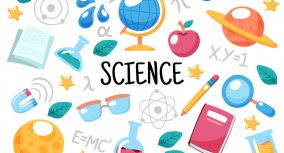
Do you enjoy revealing the mysteries of nature? There are as many secrets in space as there are deep in the ocean. You may be the one who solves the next puzzle! Natural science focuses on our environment. We try to understand how and why everything around us works. Living...
Numbers, Facts and Trends Shaping Your World
Read our research on:
Full Topic List
Regions & Countries
- Publications
- Our Methods
- Short Reads
- Tools & Resources
Read Our Research On:
Writing Survey Questions
Perhaps the most important part of the survey process is the creation of questions that accurately measure the opinions, experiences and behaviors of the public. Accurate random sampling will be wasted if the information gathered is built on a shaky foundation of ambiguous or biased questions. Creating good measures involves both writing good questions and organizing them to form the questionnaire.
Questionnaire design is a multistage process that requires attention to many details at once. Designing the questionnaire is complicated because surveys can ask about topics in varying degrees of detail, questions can be asked in different ways, and questions asked earlier in a survey may influence how people respond to later questions. Researchers are also often interested in measuring change over time and therefore must be attentive to how opinions or behaviors have been measured in prior surveys.
Surveyors may conduct pilot tests or focus groups in the early stages of questionnaire development in order to better understand how people think about an issue or comprehend a question. Pretesting a survey is an essential step in the questionnaire design process to evaluate how people respond to the overall questionnaire and specific questions, especially when questions are being introduced for the first time.
For many years, surveyors approached questionnaire design as an art, but substantial research over the past forty years has demonstrated that there is a lot of science involved in crafting a good survey questionnaire. Here, we discuss the pitfalls and best practices of designing questionnaires.
Question development
There are several steps involved in developing a survey questionnaire. The first is identifying what topics will be covered in the survey. For Pew Research Center surveys, this involves thinking about what is happening in our nation and the world and what will be relevant to the public, policymakers and the media. We also track opinion on a variety of issues over time so we often ensure that we update these trends on a regular basis to better understand whether people’s opinions are changing.
At Pew Research Center, questionnaire development is a collaborative and iterative process where staff meet to discuss drafts of the questionnaire several times over the course of its development. We frequently test new survey questions ahead of time through qualitative research methods such as focus groups , cognitive interviews, pretesting (often using an online, opt-in sample ), or a combination of these approaches. Researchers use insights from this testing to refine questions before they are asked in a production survey, such as on the ATP.
Measuring change over time
Many surveyors want to track changes over time in people’s attitudes, opinions and behaviors. To measure change, questions are asked at two or more points in time. A cross-sectional design surveys different people in the same population at multiple points in time. A panel, such as the ATP, surveys the same people over time. However, it is common for the set of people in survey panels to change over time as new panelists are added and some prior panelists drop out. Many of the questions in Pew Research Center surveys have been asked in prior polls. Asking the same questions at different points in time allows us to report on changes in the overall views of the general public (or a subset of the public, such as registered voters, men or Black Americans), or what we call “trending the data”.
When measuring change over time, it is important to use the same question wording and to be sensitive to where the question is asked in the questionnaire to maintain a similar context as when the question was asked previously (see question wording and question order for further information). All of our survey reports include a topline questionnaire that provides the exact question wording and sequencing, along with results from the current survey and previous surveys in which we asked the question.
The Center’s transition from conducting U.S. surveys by live telephone interviewing to an online panel (around 2014 to 2020) complicated some opinion trends, but not others. Opinion trends that ask about sensitive topics (e.g., personal finances or attending religious services ) or that elicited volunteered answers (e.g., “neither” or “don’t know”) over the phone tended to show larger differences than other trends when shifting from phone polls to the online ATP. The Center adopted several strategies for coping with changes to data trends that may be related to this change in methodology. If there is evidence suggesting that a change in a trend stems from switching from phone to online measurement, Center reports flag that possibility for readers to try to head off confusion or erroneous conclusions.
Open- and closed-ended questions
One of the most significant decisions that can affect how people answer questions is whether the question is posed as an open-ended question, where respondents provide a response in their own words, or a closed-ended question, where they are asked to choose from a list of answer choices.
For example, in a poll conducted after the 2008 presidential election, people responded very differently to two versions of the question: “What one issue mattered most to you in deciding how you voted for president?” One was closed-ended and the other open-ended. In the closed-ended version, respondents were provided five options and could volunteer an option not on the list.
When explicitly offered the economy as a response, more than half of respondents (58%) chose this answer; only 35% of those who responded to the open-ended version volunteered the economy. Moreover, among those asked the closed-ended version, fewer than one-in-ten (8%) provided a response other than the five they were read. By contrast, fully 43% of those asked the open-ended version provided a response not listed in the closed-ended version of the question. All of the other issues were chosen at least slightly more often when explicitly offered in the closed-ended version than in the open-ended version. (Also see “High Marks for the Campaign, a High Bar for Obama” for more information.)
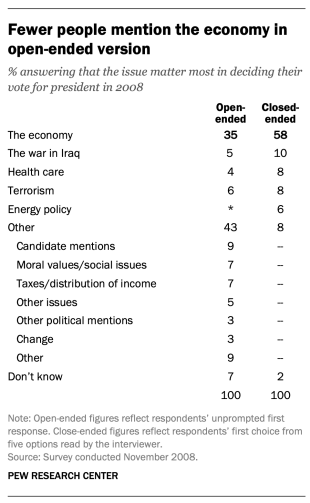
Researchers will sometimes conduct a pilot study using open-ended questions to discover which answers are most common. They will then develop closed-ended questions based off that pilot study that include the most common responses as answer choices. In this way, the questions may better reflect what the public is thinking, how they view a particular issue, or bring certain issues to light that the researchers may not have been aware of.
When asking closed-ended questions, the choice of options provided, how each option is described, the number of response options offered, and the order in which options are read can all influence how people respond. One example of the impact of how categories are defined can be found in a Pew Research Center poll conducted in January 2002. When half of the sample was asked whether it was “more important for President Bush to focus on domestic policy or foreign policy,” 52% chose domestic policy while only 34% said foreign policy. When the category “foreign policy” was narrowed to a specific aspect – “the war on terrorism” – far more people chose it; only 33% chose domestic policy while 52% chose the war on terrorism.
In most circumstances, the number of answer choices should be kept to a relatively small number – just four or perhaps five at most – especially in telephone surveys. Psychological research indicates that people have a hard time keeping more than this number of choices in mind at one time. When the question is asking about an objective fact and/or demographics, such as the religious affiliation of the respondent, more categories can be used. In fact, they are encouraged to ensure inclusivity. For example, Pew Research Center’s standard religion questions include more than 12 different categories, beginning with the most common affiliations (Protestant and Catholic). Most respondents have no trouble with this question because they can expect to see their religious group within that list in a self-administered survey.
In addition to the number and choice of response options offered, the order of answer categories can influence how people respond to closed-ended questions. Research suggests that in telephone surveys respondents more frequently choose items heard later in a list (a “recency effect”), and in self-administered surveys, they tend to choose items at the top of the list (a “primacy” effect).
Because of concerns about the effects of category order on responses to closed-ended questions, many sets of response options in Pew Research Center’s surveys are programmed to be randomized to ensure that the options are not asked in the same order for each respondent. Rotating or randomizing means that questions or items in a list are not asked in the same order to each respondent. Answers to questions are sometimes affected by questions that precede them. By presenting questions in a different order to each respondent, we ensure that each question gets asked in the same context as every other question the same number of times (e.g., first, last or any position in between). This does not eliminate the potential impact of previous questions on the current question, but it does ensure that this bias is spread randomly across all of the questions or items in the list. For instance, in the example discussed above about what issue mattered most in people’s vote, the order of the five issues in the closed-ended version of the question was randomized so that no one issue appeared early or late in the list for all respondents. Randomization of response items does not eliminate order effects, but it does ensure that this type of bias is spread randomly.
Questions with ordinal response categories – those with an underlying order (e.g., excellent, good, only fair, poor OR very favorable, mostly favorable, mostly unfavorable, very unfavorable) – are generally not randomized because the order of the categories conveys important information to help respondents answer the question. Generally, these types of scales should be presented in order so respondents can easily place their responses along the continuum, but the order can be reversed for some respondents. For example, in one of Pew Research Center’s questions about abortion, half of the sample is asked whether abortion should be “legal in all cases, legal in most cases, illegal in most cases, illegal in all cases,” while the other half of the sample is asked the same question with the response categories read in reverse order, starting with “illegal in all cases.” Again, reversing the order does not eliminate the recency effect but distributes it randomly across the population.
Question wording
The choice of words and phrases in a question is critical in expressing the meaning and intent of the question to the respondent and ensuring that all respondents interpret the question the same way. Even small wording differences can substantially affect the answers people provide.
[View more Methods 101 Videos ]
An example of a wording difference that had a significant impact on responses comes from a January 2003 Pew Research Center survey. When people were asked whether they would “favor or oppose taking military action in Iraq to end Saddam Hussein’s rule,” 68% said they favored military action while 25% said they opposed military action. However, when asked whether they would “favor or oppose taking military action in Iraq to end Saddam Hussein’s rule even if it meant that U.S. forces might suffer thousands of casualties, ” responses were dramatically different; only 43% said they favored military action, while 48% said they opposed it. The introduction of U.S. casualties altered the context of the question and influenced whether people favored or opposed military action in Iraq.
There has been a substantial amount of research to gauge the impact of different ways of asking questions and how to minimize differences in the way respondents interpret what is being asked. The issues related to question wording are more numerous than can be treated adequately in this short space, but below are a few of the important things to consider:
First, it is important to ask questions that are clear and specific and that each respondent will be able to answer. If a question is open-ended, it should be evident to respondents that they can answer in their own words and what type of response they should provide (an issue or problem, a month, number of days, etc.). Closed-ended questions should include all reasonable responses (i.e., the list of options is exhaustive) and the response categories should not overlap (i.e., response options should be mutually exclusive). Further, it is important to discern when it is best to use forced-choice close-ended questions (often denoted with a radio button in online surveys) versus “select-all-that-apply” lists (or check-all boxes). A 2019 Center study found that forced-choice questions tend to yield more accurate responses, especially for sensitive questions. Based on that research, the Center generally avoids using select-all-that-apply questions.
It is also important to ask only one question at a time. Questions that ask respondents to evaluate more than one concept (known as double-barreled questions) – such as “How much confidence do you have in President Obama to handle domestic and foreign policy?” – are difficult for respondents to answer and often lead to responses that are difficult to interpret. In this example, it would be more effective to ask two separate questions, one about domestic policy and another about foreign policy.
In general, questions that use simple and concrete language are more easily understood by respondents. It is especially important to consider the education level of the survey population when thinking about how easy it will be for respondents to interpret and answer a question. Double negatives (e.g., do you favor or oppose not allowing gays and lesbians to legally marry) or unfamiliar abbreviations or jargon (e.g., ANWR instead of Arctic National Wildlife Refuge) can result in respondent confusion and should be avoided.
Similarly, it is important to consider whether certain words may be viewed as biased or potentially offensive to some respondents, as well as the emotional reaction that some words may provoke. For example, in a 2005 Pew Research Center survey, 51% of respondents said they favored “making it legal for doctors to give terminally ill patients the means to end their lives,” but only 44% said they favored “making it legal for doctors to assist terminally ill patients in committing suicide.” Although both versions of the question are asking about the same thing, the reaction of respondents was different. In another example, respondents have reacted differently to questions using the word “welfare” as opposed to the more generic “assistance to the poor.” Several experiments have shown that there is much greater public support for expanding “assistance to the poor” than for expanding “welfare.”
We often write two versions of a question and ask half of the survey sample one version of the question and the other half the second version. Thus, we say we have two forms of the questionnaire. Respondents are assigned randomly to receive either form, so we can assume that the two groups of respondents are essentially identical. On questions where two versions are used, significant differences in the answers between the two forms tell us that the difference is a result of the way we worded the two versions.
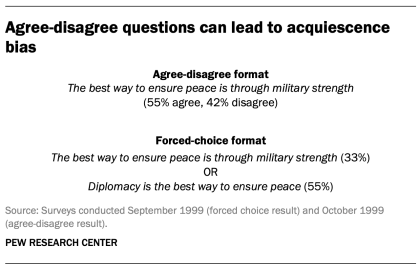
One of the most common formats used in survey questions is the “agree-disagree” format. In this type of question, respondents are asked whether they agree or disagree with a particular statement. Research has shown that, compared with the better educated and better informed, less educated and less informed respondents have a greater tendency to agree with such statements. This is sometimes called an “acquiescence bias” (since some kinds of respondents are more likely to acquiesce to the assertion than are others). This behavior is even more pronounced when there’s an interviewer present, rather than when the survey is self-administered. A better practice is to offer respondents a choice between alternative statements. A Pew Research Center experiment with one of its routinely asked values questions illustrates the difference that question format can make. Not only does the forced choice format yield a very different result overall from the agree-disagree format, but the pattern of answers between respondents with more or less formal education also tends to be very different.
One other challenge in developing questionnaires is what is called “social desirability bias.” People have a natural tendency to want to be accepted and liked, and this may lead people to provide inaccurate answers to questions that deal with sensitive subjects. Research has shown that respondents understate alcohol and drug use, tax evasion and racial bias. They also may overstate church attendance, charitable contributions and the likelihood that they will vote in an election. Researchers attempt to account for this potential bias in crafting questions about these topics. For instance, when Pew Research Center surveys ask about past voting behavior, it is important to note that circumstances may have prevented the respondent from voting: “In the 2012 presidential election between Barack Obama and Mitt Romney, did things come up that kept you from voting, or did you happen to vote?” The choice of response options can also make it easier for people to be honest. For example, a question about church attendance might include three of six response options that indicate infrequent attendance. Research has also shown that social desirability bias can be greater when an interviewer is present (e.g., telephone and face-to-face surveys) than when respondents complete the survey themselves (e.g., paper and web surveys).
Lastly, because slight modifications in question wording can affect responses, identical question wording should be used when the intention is to compare results to those from earlier surveys. Similarly, because question wording and responses can vary based on the mode used to survey respondents, researchers should carefully evaluate the likely effects on trend measurements if a different survey mode will be used to assess change in opinion over time.
Question order
Once the survey questions are developed, particular attention should be paid to how they are ordered in the questionnaire. Surveyors must be attentive to how questions early in a questionnaire may have unintended effects on how respondents answer subsequent questions. Researchers have demonstrated that the order in which questions are asked can influence how people respond; earlier questions can unintentionally provide context for the questions that follow (these effects are called “order effects”).
One kind of order effect can be seen in responses to open-ended questions. Pew Research Center surveys generally ask open-ended questions about national problems, opinions about leaders and similar topics near the beginning of the questionnaire. If closed-ended questions that relate to the topic are placed before the open-ended question, respondents are much more likely to mention concepts or considerations raised in those earlier questions when responding to the open-ended question.
For closed-ended opinion questions, there are two main types of order effects: contrast effects ( where the order results in greater differences in responses), and assimilation effects (where responses are more similar as a result of their order).
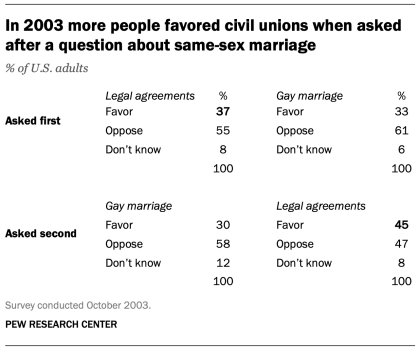
An example of a contrast effect can be seen in a Pew Research Center poll conducted in October 2003, a dozen years before same-sex marriage was legalized in the U.S. That poll found that people were more likely to favor allowing gays and lesbians to enter into legal agreements that give them the same rights as married couples when this question was asked after one about whether they favored or opposed allowing gays and lesbians to marry (45% favored legal agreements when asked after the marriage question, but 37% favored legal agreements without the immediate preceding context of a question about same-sex marriage). Responses to the question about same-sex marriage, meanwhile, were not significantly affected by its placement before or after the legal agreements question.
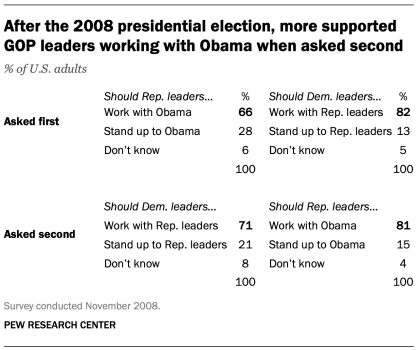
Another experiment embedded in a December 2008 Pew Research Center poll also resulted in a contrast effect. When people were asked “All in all, are you satisfied or dissatisfied with the way things are going in this country today?” immediately after having been asked “Do you approve or disapprove of the way George W. Bush is handling his job as president?”; 88% said they were dissatisfied, compared with only 78% without the context of the prior question.
Responses to presidential approval remained relatively unchanged whether national satisfaction was asked before or after it. A similar finding occurred in December 2004 when both satisfaction and presidential approval were much higher (57% were dissatisfied when Bush approval was asked first vs. 51% when general satisfaction was asked first).
Several studies also have shown that asking a more specific question before a more general question (e.g., asking about happiness with one’s marriage before asking about one’s overall happiness) can result in a contrast effect. Although some exceptions have been found, people tend to avoid redundancy by excluding the more specific question from the general rating.
Assimilation effects occur when responses to two questions are more consistent or closer together because of their placement in the questionnaire. We found an example of an assimilation effect in a Pew Research Center poll conducted in November 2008 when we asked whether Republican leaders should work with Obama or stand up to him on important issues and whether Democratic leaders should work with Republican leaders or stand up to them on important issues. People were more likely to say that Republican leaders should work with Obama when the question was preceded by the one asking what Democratic leaders should do in working with Republican leaders (81% vs. 66%). However, when people were first asked about Republican leaders working with Obama, fewer said that Democratic leaders should work with Republican leaders (71% vs. 82%).
The order questions are asked is of particular importance when tracking trends over time. As a result, care should be taken to ensure that the context is similar each time a question is asked. Modifying the context of the question could call into question any observed changes over time (see measuring change over time for more information).
A questionnaire, like a conversation, should be grouped by topic and unfold in a logical order. It is often helpful to begin the survey with simple questions that respondents will find interesting and engaging. Throughout the survey, an effort should be made to keep the survey interesting and not overburden respondents with several difficult questions right after one another. Demographic questions such as income, education or age should not be asked near the beginning of a survey unless they are needed to determine eligibility for the survey or for routing respondents through particular sections of the questionnaire. Even then, it is best to precede such items with more interesting and engaging questions. One virtue of survey panels like the ATP is that demographic questions usually only need to be asked once a year, not in each survey.
U.S. Surveys
Other research methods, sign up for our weekly newsletter.
Fresh data delivered Saturday mornings
1615 L St. NW, Suite 800 Washington, DC 20036 USA (+1) 202-419-4300 | Main (+1) 202-857-8562 | Fax (+1) 202-419-4372 | Media Inquiries
Research Topics
- Age & Generations
- Coronavirus (COVID-19)
- Economy & Work
- Family & Relationships
- Gender & LGBTQ
- Immigration & Migration
- International Affairs
- Internet & Technology
- Methodological Research
- News Habits & Media
- Non-U.S. Governments
- Other Topics
- Politics & Policy
- Race & Ethnicity
- Email Newsletters
ABOUT PEW RESEARCH CENTER Pew Research Center is a nonpartisan fact tank that informs the public about the issues, attitudes and trends shaping the world. It conducts public opinion polling, demographic research, media content analysis and other empirical social science research. Pew Research Center does not take policy positions. It is a subsidiary of The Pew Charitable Trusts .
Copyright 2024 Pew Research Center
Terms & Conditions
Privacy Policy
Cookie Settings
Reprints, Permissions & Use Policy
'ZDNET Recommends': What exactly does it mean?
ZDNET's recommendations are based on many hours of testing, research, and comparison shopping. We gather data from the best available sources, including vendor and retailer listings as well as other relevant and independent reviews sites. And we pore over customer reviews to find out what matters to real people who already own and use the products and services we’re assessing.
When you click through from our site to a retailer and buy a product or service, we may earn affiliate commissions. This helps support our work, but does not affect what we cover or how, and it does not affect the price you pay. Neither ZDNET nor the author are compensated for these independent reviews. Indeed, we follow strict guidelines that ensure our editorial content is never influenced by advertisers.
ZDNET's editorial team writes on behalf of you, our reader. Our goal is to deliver the most accurate information and the most knowledgeable advice possible in order to help you make smarter buying decisions on tech gear and a wide array of products and services. Our editors thoroughly review and fact-check every article to ensure that our content meets the highest standards. If we have made an error or published misleading information, we will correct or clarify the article. If you see inaccuracies in our content, please report the mistake via this form .
How to write better ChatGPT prompts in 5 steps

ChatGPT is the generative artificial intelligence (AI) tool that's taken the world by storm. While there's always the possibility it will simply make stuff up , there's a lot you can do when crafting prompts to ensure the best possible outcome. That's what we'll be exploring in this how-to.
In this article, we'll show you how to write prompts that encourage the large language model (LLM) that powers ChatGPT to provide the best possible answers.
Also: Have 10 hours? IBM will train you in AI fundamentals - for free
Writing effective prompts, known as prompt engineering, has even become its own highly-paid discipline . Who knows? These tips could help you build the skills to become one of those highly paid prompt engineers. Apparently, these gigs can pay from $175,000 to $335,000 per year.
How to write effective ChatGPT prompts
1. talk to the ai like you would a person.
One of the more interesting things I had to get used to when working with ChatGPT is that you don't program it, you talk to it. As a formally trained programmer, I've had to leave a lot of habits by the wayside when engaging with AI. Talking to it (and with it) requires a mindset shift.
When I say talk to it like a person, I mean talk to it like you would a co-worker or team member. If that's hard to do, give it a name. Alexa is taken, so maybe think of it as "Bob". This naming helps because when you talk to Bob, you might include conversational details, little anecdotes that give your story texture.
Also: How to use ChatGPT to write code
When talking to a person, it would be natural for them to miss your point initially and require clarification, or veer away from the topic at hand and need to be wrangled back. You might need to fill in the backstory for them, or restate complex questions based on the answers they give you.
This is called interactive prompting. Don't be afraid to ask multi-step questions: ask, get a response, and based on that response, ask another question. I've done this myself, sometimes 10 or 20 times in a row, and gotten very powerful results. Think of this as having a conversation with ChatGPT.
2. Set the stage and provide context
Writing a ChatGPT prompt is more than just asking a one-sentence question. It often involves providing relevant background information to set the context of the query.
Let's say that you want to prepare for a marathon (for the record, I do not run, dance, or jump -- this is merely an example). You could ask ChatGPT:
How can I prepare for a marathon?
However, you'll get a far more nuanced answer if you add that you're training for your first marathon. Try this instead:
I am a beginner runner and have never run a marathon before, but I want to complete one in six months. How can I prepare for a marathon?
By giving the AI more information, you're helping it return a more focused answer. Even with ChatGPT's help, there's no way I'm going to run a marathon (unless I'm doing it with a V-Twin motor under my seat). Here are two more examples of questions that provide context:
I am planning to travel to Spain in a few months and would like to learn some basic Spanish to help me communicate with local residents. I am looking for online resources that are suitable for beginners and provide a structured and comprehensive approach to learning the language. Can you recommend some online resources for learning Spanish as a beginner?
In this case, rather than just asking about learning resources, the context helps focus the AI on learning how to communicate on the ground with local residents. Here's another example:
I am a business owner interested in exploring how blockchain technology can be used to improve supply chain efficiency and transparency. I am looking for a clear and concise explanation of the technology and examples of how it has been used in the context of supply chain management. Can you explain the concept of blockchain technology and its potential applications in supply chain management?
In this example, rather than just asking for information on blockchain and how it works, the focus is specifically on blockchain for supply chain efficiency and how it might be used in a real-world scenario.
Also: How to use Image Creator from Microsoft Designer (formerly Bing Image Creator) Lastly, let's get into how to construct a detailed prompt.
One note: I limit the answer to 500 words because ChatGPT seems to break when asked to produce somewhere between 500 and 700 words, leaving stories mid-sentence and not resuming properly when asked to continue. I hope future versions provide longer answers, because premises like this can generate fun story beginnings:
Write a short story for me, no more than 500 words. The story takes place in 2339, in Boston. The entire story takes place inside a Victorian-style bookstore that wouldn't be out of place in Diagon Alley. Inside the store are the following characters, all human: The proprietor: make this person interesting and a bit unusual, give them a name and at least one skill or characteristic that influences their backstory and possibly influences the entire short story. The helper: this is a clerk in the store. His name is Todd. The customer and his friend: Two customers came into the store together, Jackson and Ophelia. Jackson is dressed as if he's going to a Steampunk convention, while Ophelia is clearly coming home from her day working in a professional office. Another customer is Evangeline, a regular customer in the store, in her mid-40s. Yet another customer is Archibald, a man who could be anywhere from 40 to 70 years old. He has a mysterious air about himself and seems both somewhat grandiose and secretive. There is something about Archibald that makes the others uncomfortable. A typical concept in retail sales is that there's always more inventory "in the back," where there's a storeroom for additional goods that might not be shown on the shelves where customers browse. The premise of this story is that there is something very unusual about this store's "in the back." Put it all together and tell something compelling and fun.
You can see how the detail provides more for the AI to work with. First, feed "Write me a story about a bookstore" into ChatGPT and see what it gives you. Then feed in the above prompt and you'll see the difference.
3. Tell the AI to assume an identity or profession
One of ChatGPT's coolest features is that it can write from the point of view of a specific person or profession. In a previous article, I showed how you can make ChatGPT write like a pirate or Shakespeare , but you can also have it write like a teacher, a marketing executive, a fiction writer -- anyone you want.
Also: How ChatGPT can rewrite and improve your existing code
For example, I can ask ChatGPT to describe the Amazon Echo smart home device, but to do so from the point of view of a product manager, a caregiver, and a journalist in three separate prompts:
From the point of view of its product manager, describe the Amazon Echo Alexa device. From the point of view of an adult child caring for an elderly parent, describe the Amazon Echo Alexa device. From the point of view of a journalist, describe the Amazon Echo Alexa device.
Try dropping these three prompts into ChatGPT to see its complete response.
I've pulled a few lines from ChatGPT's responses, so you can see how it interprets different perspectives. From the product manager identity: I can confidently say that this is one of the most innovative and revolutionary products in the smart home industry.
From the caregiver identity: The device's ability to set reminders and alarms can be particularly helpful for elderly individuals who may have trouble remembering to take their medication or attend appointments.
Also: 5 ways to explore the use of generative AI at work
And from the journalist identity: From a journalistic perspective, the Echo has made headlines due to privacy concerns surrounding the collection and storage of user data.
You can see how different identities allow the AI to provide different perspectives as part of its response. To expand this, you can let the AI do a thought experiment. Let's look at some of the issues that went into the creation of something like Alexa:
The year is 2012. Siri has been out for the iPhone for about a year, but nothing like an Alexa smart home device has been released. The scene is an Amazon board meeting where the Echo smart assistant based on Alexa has just been proposed. Provide the arguments, pro and con, that board members at that meeting would have been likely to discuss as part of their process of deciding whether or not to approve spending to invest in developing the device. Feel free to also include participation by engineering design experts and product champions, if that provides more comprehensive perspective.
It's also good to know that making minor changes to your prompts can significantly change ChatGPT's response. For example, when I changed the phrase, "Provide the arguments, pro and con, that..." to "Provide the pro and con arguments as dialogue, that...," ChatGPT rewrote its answer, switching from a list of enumerated pros and cons to an actual dialogue between participants.
4. Keep ChatGPT on track
As mentioned above, ChatGPT has a tendency to go off the rails, lose track of the discussion, or completely fabricate answers.
There are a few techniques you can use to help keep it on track and honest.
One of my favorite things to do is ask ChatGPT to justify its responses. I'll use phrases like "Why do you think that?" or "What evidence supports your answer?" Often, the AI will simply apologize for making stuff up and come back with a new answer. Other times, it might give you some useful information about its reasoning path. In any case, don't forget to apply the tips I provide for having ChatGPT cite sources .
Also: My two favorite ChatGPT Plus features and the remarkable things I can do with them
If you have a fairly long conversation with ChatGPT, you'll start to notice that the AI loses the thread. Not that that's unique to AIs -- even in extended conversations with humans, someone is bound to get lost. That said, you can gently guide the AI back on track by reminding it what the topic is, as well as what you're trying to explore.
5. Don't be afraid to play and experiment
One of the best ways to up your skill at this craft is to play around with what the chatbot can do.
Try feeding ChatGPT a variety of interesting prompts to see what it will do with them. Then change them up and see what happens. Here are five to get you started:
- Imagine you are a raindrop falling from the sky during a thunderstorm. Describe your journey from the moment you form in the cloud to the moment you hit the ground. What do you see, feel, and experience?
- You are a toy that has been left behind in an attic for decades. Narrate your feelings, memories of playtimes past, and your hopes of being rediscovered.
- Write the final diary entry of a time traveler who has decided to settle down in a specific era, explaining why they chose that time and what they've learned from their travels.
- Imagine a dialogue between two unlikely objects, like a teacup and a wristwatch, discussing the daily routines and challenges they face.
- Describe a day in an ant colony from the perspective of an ant. Dive deep into the politics, challenges, and social structures of the ant world.
Pay attention not only to what the AI generates, but how it generates what it does, what mistakes it makes, and where it seems to run into limits. All of that detail will help you expand your prompting horizons.
More prompt-writing tips
- Feel free to re-ask the question. ChatGPT will often change its answer with each ask.
- Make small changes to your prompts to guide it into giving you a better answer.
- ChatGPT will retain its awareness of previous conversations as long as the current page is open. If you leave that page, it will lose awareness. To be clear, ChatGPT will also sometimes lose the thread of the conversation without reason, so be aware you may need to start over from time to time.
- Similarly, opening a new page will start the discussion with fresh responses.
- Be sure to specify the length of the response you want. Answers over about 500 words sometimes break down.
- You can correct and clarify prompts based on how the AI answered previously. If it's misinterpreting you, you may be able to just tell it what it missed and continue.
- Rephrase questions if ChatGPT doesn't want to answer what you're asking. Use personas to elicit answers that it might not otherwise want to give.
- If you want sources cited , tell it to support or justify its answers.
- ChatGPT custom instructions are now available to free users. You can give ChatGPT a set of prompts that are always available , so you don't have to retype them.
- Keep experimenting.
- Consider getting the ChatGPT Plus subscription . You can then use your own data for powerful analytics . You can also pull data from the Web .
- Try asking the same question of Gemini (formerly Bard) or Copilot (formerly Bing Chat). Both will interpret your prompts differently and answer differently. This is effectively getting a second opinion on your prompt, and can give you alternate perspectives.
- Ask for examples. If you want to see how well ChatGPT understands what you're asking for, ask it "Can you give me three examples of how that works?" or similar questions.
- Ask it to repeat parts of your original requests back to you. For example, if you feed it an article to analyze, you can tell it something like, "Just to be sure you understand, please echo back the first three headlines," or "I want to be sure you understand what I mean, so summarize the main conflict discussed in this article."
- Sometimes ChatGPT just fails. Keep trying, but also be willing to give up and move on to other tools. It's not perfect...yet.
What type of prompts work best with ChatGPT?
Part of what makes ChatGPT so compelling is you can ask it almost anything. That said, keep in mind that it's designed to provide written answers. If you want a list of websites, you're better off talking to Google.
Also: How to use DALL-E 3 in ChatGPT
If you want some form of computation, talk to Wolfram Alpha . Give ChatGPT open-ended prompts, encourage creativity, and don't be afraid to share personal experiences or emotions. Plus, keep in mind that the AI's knowledge ends in 2021 for ChatGPT 3.5 and December 2023 for ChatGPT 4 in ChatGPT Plus.
How can I adjust the complexity of ChatGPT responses?
You can directly specify the complexity level by including it in your prompt. Add "... at a high school level" or "... at a level intended for a Ph.D. to understand" to the end of your question. You can also increase complexity of output by increasing the richness of your input. The more you provide in your prompt, the more detailed and nuanced ChatGPT's response will be. You can also include other specific instructions, like "Give me a summary," "Explain in detail," or "Provide a technical description."
Also: How does ChatGPT actually work?
You can also pre-define profiles. For example, you could say "When evaluating something for a manager, assume an individual with a four-year business college education, a lack of detailed technical understanding, and a fairly limited attention span, who likes to get answers that are clear and concise. When evaluating something for a programmer, assume considerable technical knowledge, an enjoyment of geek and science fiction references, and a desire for a complete answer. Accuracy is deeply important to programmers, so double-check your work."
If you ask ChatGPT to "explain C++ to a manager" and "explain C++ to a programmer," you'll see how the responses differ.
What do I do if ChatGPT refuses to answer or I don't like its answer?
There are some guardrails built into ChatGPT. It tends to shut down if you ask it political questions, for example. That's what's built into the system. While you might be able to tease out an answer, it's probably not going to provide great value. That said, feel free to keep trying with different phrasing or perspectives.
You can follow my day-to-day project updates on social media. Be sure to subscribe to my weekly update newsletter on Substack , and follow me on Twitter at @DavidGewirtz , on Facebook at Facebook.com/DavidGewirtz , on Instagram at Instagram.com/DavidGewirtz , and on YouTube at YouTube.com/DavidGewirtzTV .
More on AI tools
Google releases two new free resources to help you optimize your ai prompts, humane ai pin: what went wrong and how it can be fixed (before it's too late), how to get started with meta ai in facebook, instagram, and more.
What Do Admission Committees Look For in College Applicants?

When it comes time for your college or graduate school search, the application process can be the most daunting part. From asking for recommendation letters to writing a stellar essay, applying to college is no walk in the park, especially when you're juggling multiple applications at once. After finally submitting your application, you may be ready to take a deep breath and relax. But even still, you may find yourself asking questions such as, what will the admissions committee think of my application? Was my application good enough? Understanding what admissions looks for in applicants can help you craft a stellar application.
What Do Admissions Committees Look For in College Applicants?
College applications ask for a variety of information and materials, which may initially feel overwhelming. However, it's essential to view this process as your opportunity to personalize your application and showcase your unique strengths, interests, and experiences. College admissions officers typically look for a combination of academic achievements, extracurricular activities, personal qualities, and unique experiences, taking a holistic approach to evaluating college applicants. In this blog, we'll go over each criteria the admissions committee considers when reviewing college applications so that you can feel confident in your submission.
1. Academic performance
As you probably already know, a key component to a college application is academic performance . Whether you're applying to college from high school or looking to earn your master’s degree, there are several grade criteria that admissions take into consideration. Not only is your GPA considered, but the types of courses you took plays an important role. Taking rigorous courses such as AP courses in high school or upper-level courses in college will strengthen your academic profile. The admissions committee wants to see evidence of strong academic performance and the ability to handle college-level coursework.

2. Essays and personal statements
Essay prompts and personal statements are a common aspect of a college application. Personal statements and essays allow you as an applicant to showcase your personality, passions, interests, and writing abilities. These writing assignments are an excellent opportunity for you to show why you’d be a great fit for the college program you’re applying to. Admissions officers look for essays that are authentic, well-written, and demonstrate self-reflection. They also look to determine how the program will help you meet your goals. Be creative and most importantly, be yourself so that your essay can be compelling, memorable, and an accurate reflection of who you are.
3. Letters of recommendation
A letter of recommendation is your chance to further support your application from a different perspective. Letters of recommendation from teachers, counselors, coaches, supervisors, or mentors provide insights into an applicants' character, work ethic, and potential for success in college. A recommendation letter can offer anecdotes, examples, and observations that test scores and essays can’t. When requesting recommendation letters , ask academic or professional sources that you have developed a meaningful connection with and who can provide positive insights about your character and abilities. Strong letters of recommendation can help applicants stand out.

4. Extracurricular activities
Being involved in extracurricular activities can help demonstrate your well-roundedness and passions, which will further strengthen your application. Admissions committees will get a greater sense of who you are and what you are interested in, which can help them determine whether you’d be a good fit for the program. They also look to see how you are able to balance activity involvement with academics. If you’re involved in a few extracurriculars, be sure to highlight them in your application, whether it's a sports team, student club, volunteer work, or an internship.

5. Demonstrated interest
Another important factor that admission committee’s take into consideration when evaluating college applications is the students interest in the school and program they’re applying to. The committee wants to see a student’s demonstrated interest as it can help them determine that the student will fit with the campus culture and community, and that they are more likely to enroll in the school. Applying early, expressing your eagerness in your essays, showing off your knowledge of the school or program you're applying to, and attending college events such as open houses or information sessions are all ways you can demonstrate your interest to the committee.
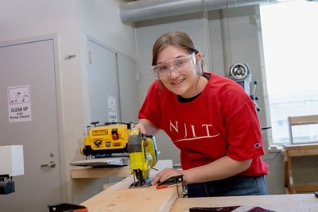
Tips for Crafting a Standout College Application
Now that you have a better understanding of what goes on in the admissions process, here are a few tips to help you craft a standout college application.
1. Make your application strong where you can
Overall, the review of college applications by admissions is typically a holistic process and no single factor determines admission. If you feel that your application might be lacking in an area or two, you can likely compensate for it by showcasing strength elsewhere. If you have great writing skills, be sure to write a stellar essay. Or, if you participated in different extracurricular activities, highlight your accomplishments in your application. Be sure to make your application as strong as possible where you can.

2. Proofread
It may seem simple, but proofreading not just your essay, but all of your application material is a crucial part of your college application. Be sure to read over your personal statement, resume, essays, and any forms you fill out for any grammatical errors and spelling mistakes. Having a second pair of eyes can be helpful to catch any mistakes you may have missed, so don’t hesitate to ask a friend, family member, or teacher for help.

3. Stay organized
Chances are you aren’t applying to just one college. You may have a few top choices for universities you’d like to attend on your radar, and a few backup options for extra measure. Having several applications you're working on is even more reason to stay organized. Keep track of application deadlines, requirements, and submission materials for each college you're applying to. You can create a checklist or use a planner to stay organized throughout the process.

Create an outstanding college application
Crafting a great college application can be challenging, but understanding key components and guidelines can make the process easier and less stressful. When completing your application, try to do your best for each component and emphasize your strengths. All in all, the admissions committee simply wants to see if you’d be a good fit for the school, and having a strong application that aligns with your goals and the program will help you stand out. If you’re ready to begin the next step in your academic journey, apply to one of NJIT’s top-STEM programs today .
- Skip to main content
- Keyboard shortcuts for audio player
NPR suspends veteran editor as it grapples with his public criticism

David Folkenflik

NPR suspended senior editor Uri Berliner for five days without pay after he wrote an essay accusing the network of losing the public's trust and appeared on a podcast to explain his argument. Uri Berliner hide caption
NPR suspended senior editor Uri Berliner for five days without pay after he wrote an essay accusing the network of losing the public's trust and appeared on a podcast to explain his argument.
NPR has formally punished Uri Berliner, the senior editor who publicly argued a week ago that the network had "lost America's trust" by approaching news stories with a rigidly progressive mindset.
Berliner's five-day suspension without pay, which began last Friday, has not been previously reported.
Yet the public radio network is grappling in other ways with the fallout from Berliner's essay for the online news site The Free Press . It angered many of his colleagues, led NPR leaders to announce monthly internal reviews of the network's coverage, and gave fresh ammunition to conservative and partisan Republican critics of NPR, including former President Donald Trump.
Conservative activist Christopher Rufo is among those now targeting NPR's new chief executive, Katherine Maher, for messages she posted to social media years before joining the network. Among others, those posts include a 2020 tweet that called Trump racist and another that appeared to minimize rioting during social justice protests that year. Maher took the job at NPR last month — her first at a news organization .
In a statement Monday about the messages she had posted, Maher praised the integrity of NPR's journalists and underscored the independence of their reporting.
"In America everyone is entitled to free speech as a private citizen," she said. "What matters is NPR's work and my commitment as its CEO: public service, editorial independence, and the mission to serve all of the American public. NPR is independent, beholden to no party, and without commercial interests."
The network noted that "the CEO is not involved in editorial decisions."
In an interview with me later on Monday, Berliner said the social media posts demonstrated Maher was all but incapable of being the person best poised to direct the organization.
"We're looking for a leader right now who's going to be unifying and bring more people into the tent and have a broader perspective on, sort of, what America is all about," Berliner said. "And this seems to be the opposite of that."

Conservative critics of NPR are now targeting its new chief executive, Katherine Maher, for messages she posted to social media years before joining the public radio network last month. Stephen Voss/Stephen Voss hide caption
Conservative critics of NPR are now targeting its new chief executive, Katherine Maher, for messages she posted to social media years before joining the public radio network last month.
He said that he tried repeatedly to make his concerns over NPR's coverage known to news leaders and to Maher's predecessor as chief executive before publishing his essay.
Berliner has singled out coverage of several issues dominating the 2020s for criticism, including trans rights, the Israel-Hamas war and COVID. Berliner says he sees the same problems at other news organizations, but argues NPR, as a mission-driven institution, has a greater obligation to fairness.
"I love NPR and feel it's a national trust," Berliner says. "We have great journalists here. If they shed their opinions and did the great journalism they're capable of, this would be a much more interesting and fulfilling organization for our listeners."
A "final warning"
The circumstances surrounding the interview were singular.
Berliner provided me with a copy of the formal rebuke to review. NPR did not confirm or comment upon his suspension for this article.
In presenting Berliner's suspension Thursday afternoon, the organization told the editor he had failed to secure its approval for outside work for other news outlets, as is required of NPR journalists. It called the letter a "final warning," saying Berliner would be fired if he violated NPR's policy again. Berliner is a dues-paying member of NPR's newsroom union but says he is not appealing the punishment.
The Free Press is a site that has become a haven for journalists who believe that mainstream media outlets have become too liberal. In addition to his essay, Berliner appeared in an episode of its podcast Honestly with Bari Weiss.
A few hours after the essay appeared online, NPR chief business editor Pallavi Gogoi reminded Berliner of the requirement that he secure approval before appearing in outside press, according to a copy of the note provided by Berliner.
In its formal rebuke, NPR did not cite Berliner's appearance on Chris Cuomo's NewsNation program last Tuesday night, for which NPR gave him the green light. (NPR's chief communications officer told Berliner to focus on his own experience and not share proprietary information.) The NPR letter also did not cite his remarks to The New York Times , which ran its article mid-afternoon Thursday, shortly before the reprimand was sent. Berliner says he did not seek approval before talking with the Times .

NPR defends its journalism after senior editor says it has lost the public's trust
Berliner says he did not get permission from NPR to speak with me for this story but that he was not worried about the consequences: "Talking to an NPR journalist and being fired for that would be extraordinary, I think."
Berliner is a member of NPR's business desk, as am I, and he has helped to edit many of my stories. He had no involvement in the preparation of this article and did not see it before it was posted publicly.
In rebuking Berliner, NPR said he had also publicly released proprietary information about audience demographics, which it considers confidential. He said those figures "were essentially marketing material. If they had been really good, they probably would have distributed them and sent them out to the world."
Feelings of anger and betrayal inside the newsroom
His essay and subsequent public remarks stirred deep anger and dismay within NPR. Colleagues contend Berliner cherry-picked examples to fit his arguments and challenge the accuracy of his accounts. They also note he did not seek comment from the journalists involved in the work he cited.
Morning Edition host Michel Martin told me some colleagues at the network share Berliner's concerns that coverage is frequently presented through an ideological or idealistic prism that can alienate listeners.
"The way to address that is through training and mentorship," says Martin, herself a veteran of nearly two decades at the network who has also reported for The Wall Street Journal and ABC News. "It's not by blowing the place up, by trashing your colleagues, in full view of people who don't really care about it anyway."
Several NPR journalists told me they are no longer willing to work with Berliner as they no longer have confidence that he will keep private their internal musings about stories as they work through coverage.
"Newsrooms run on trust," NPR political correspondent Danielle Kurtzleben tweeted last week, without mentioning Berliner by name. "If you violate everyone's trust by going to another outlet and sh--ing on your colleagues (while doing a bad job journalistically, for that matter), I don't know how you do your job now."
Berliner rejected that critique, saying nothing in his essay or subsequent remarks betrayed private observations or arguments about coverage.
Other newsrooms are also grappling with questions over news judgment and confidentiality. On Monday, New York Times Executive Editor Joseph Kahn announced to his staff that the newspaper's inquiry into who leaked internal dissent over a planned episode of its podcast The Daily to another news outlet proved inconclusive. The episode was to focus on a December report on the use of sexual assault as part of the Hamas attack on Israel in October. Audio staffers aired doubts over how well the reporting stood up to scrutiny.
"We work together with trust and collegiality everyday on everything we produce, and I have every expectation that this incident will prove to be a singular exception to an important rule," Kahn wrote to Times staffers.
At NPR, some of Berliner's colleagues have weighed in online against his claim that the network has focused on diversifying its workforce without a concomitant commitment to diversity of viewpoint. Recently retired Chief Executive John Lansing has referred to this pursuit of diversity within NPR's workforce as its " North Star ," a moral imperative and chief business strategy.
In his essay, Berliner tagged the strategy as a failure, citing the drop in NPR's broadcast audiences and its struggle to attract more Black and Latino listeners in particular.
"During most of my tenure here, an open-minded, curious culture prevailed. We were nerdy, but not knee-jerk, activist, or scolding," Berliner writes. "In recent years, however, that has changed."
Berliner writes, "For NPR, which purports to consider all things, it's devastating both for its journalism and its business model."
NPR investigative reporter Chiara Eisner wrote in a comment for this story: "Minorities do not all think the same and do not report the same. Good reporters and editors should know that by now. It's embarrassing to me as a reporter at NPR that a senior editor here missed that point in 2024."
Some colleagues drafted a letter to Maher and NPR's chief news executive, Edith Chapin, seeking greater clarity on NPR's standards for its coverage and the behavior of its journalists — clearly pointed at Berliner.
A plan for "healthy discussion"
On Friday, CEO Maher stood up for the network's mission and the journalism, taking issue with Berliner's critique, though never mentioning him by name. Among her chief issues, she said Berliner's essay offered "a criticism of our people on the basis of who we are."
Berliner took great exception to that, saying she had denigrated him. He said that he supported diversifying NPR's workforce to look more like the U.S. population at large. She did not address that in a subsequent private exchange he shared with me for this story. (An NPR spokesperson declined further comment.)
Late Monday afternoon, Chapin announced to the newsroom that Executive Editor Eva Rodriguez would lead monthly meetings to review coverage.
"Among the questions we'll ask of ourselves each month: Did we capture the diversity of this country — racial, ethnic, religious, economic, political geographic, etc — in all of its complexity and in a way that helped listeners and readers recognize themselves and their communities?" Chapin wrote in the memo. "Did we offer coverage that helped them understand — even if just a bit better — those neighbors with whom they share little in common?"
Berliner said he welcomed the announcement but would withhold judgment until those meetings played out.
In a text for this story, Chapin said such sessions had been discussed since Lansing unified the news and programming divisions under her acting leadership last year.
"Now seemed [the] time to deliver if we were going to do it," Chapin said. "Healthy discussion is something we need more of."
Disclosure: This story was reported and written by NPR Media Correspondent David Folkenflik and edited by Deputy Business Editor Emily Kopp and Managing Editor Gerry Holmes. Under NPR's protocol for reporting on itself, no NPR corporate official or news executive reviewed this story before it was posted publicly.
- Katherine Maher
- uri berliner
- Share full article
Advertisement
Supported by
Guest Essay
What Sentencing Could Look Like if Trump Is Found Guilty

By Norman L. Eisen
Mr. Eisen is the author of “Trying Trump: A Guide to His First Election Interference Criminal Trial.”
For all the attention to and debate over the unfolding trial of Donald Trump in Manhattan, there has been surprisingly little of it paid to a key element: its possible outcome and, specifically, the prospect that a former and potentially future president could be sentenced to prison time.
The case — brought by Alvin Bragg, the Manhattan district attorney, against Mr. Trump — represents the first time in our nation’s history that a former president is a defendant in a criminal trial. As such, it has generated lots of debate about the case’s legal strength and integrity, as well as its potential impact on Mr. Trump’s efforts to win back the White House.
A review of thousands of cases in New York that charged the same felony suggests something striking: If Mr. Trump is found guilty, incarceration is an actual possibility. It’s not certain, of course, but it is plausible.
Jury selection has begun, and it’s not too soon to talk about what the possibility of a sentence, including a prison sentence, would look like for Mr. Trump, for the election and for the country — including what would happen if he is re-elected.
The case focuses on alleged interference in the 2016 election, which consisted of a hush-money payment Michael Cohen, the former president’s fixer at the time, made in 2016 to a porn star, Stormy Daniels, who said she had an affair with Mr. Trump. Mr. Bragg is arguing that the cover-up cheated voters of the chance to fully assess Mr. Trump’s candidacy.
This may be the first criminal trial of a former president in American history, but if convicted, Mr. Trump’s fate is likely to be determined by the same core factors that guide the sentencing of every criminal defendant in New York State Court.
Comparable cases. The first factor is the base line against which judges measure all sentences: how other defendants have been treated for similar offenses. My research encompassed almost 10,000 cases of felony falsifying business records that have been prosecuted across the state of New York since 2015. Over a similar period, the Manhattan D.A. has charged over 400 of these cases . In roughly the first year of Mr. Bragg’s tenure, his team alone filed 166 felony counts for falsifying business records against 34 people or companies.
Contrary to claims that there will be no sentence of incarceration for falsifying business records, when a felony conviction involves serious misconduct, defendants can be sentenced to some prison time. My analysis of the most recent data indicates that approximately one in 10 cases in which the most serious charge at arraignment is falsifying business records in the first degree and in which the court ultimately imposes a sentence, results in a term of imprisonment.
To be clear, these cases generally differ from Mr. Trump’s case in one important respect: They typically involve additional charges besides just falsifying records. That clearly complicates what we might expect if Mr. Trump is convicted.
Nevertheless, there are many previous cases involving falsifying business records along with other charges where the conduct was less serious than is alleged against Mr. Trump and prison time was imposed. For instance, Richard Luthmann was accused of attempting to deceive voters — in his case, impersonating New York political figures on social media in an attempt to influence campaigns. He pleaded guilty to three counts of falsifying business records in the first degree (as well as to other charges). He received a sentence of incarceration on the felony falsification counts (although the sentence was not solely attributable to the plea).
A defendant in another case was accused of stealing in excess of $50,000 from her employer and, like in this case, falsifying one or more invoices as part of the scheme. She was indicted on a single grand larceny charge and ultimately pleaded guilty to one felony count of business record falsification for a false invoice of just under $10,000. She received 364 days in prison.
To be sure, for a typical first-time offender charged only with run-of-the-mill business record falsification, a prison sentence would be unlikely. On the other hand, Mr. Trump is being prosecuted for 34 counts of conduct that might have changed the course of American history.
Seriousness of the crime. Mr. Bragg alleges that Mr. Trump concealed critical information from voters (paying hush money to suppress an extramarital relationship) that could have harmed his campaign, particularly if it came to light after the revelation of another scandal — the “Access Hollywood” tape . If proved, that could be seen not just as unfortunate personal judgment but also, as Justice Juan Merchan has described it, an attempt “to unlawfully influence the 2016 presidential election.”
History and character. To date, Mr. Trump has been unrepentant about the events alleged in this case. There is every reason to believe that will not change even if he is convicted, and lack of remorse is a negative at sentencing. Justice Merchan’s evaluation of Mr. Trump’s history and character may also be informed by the other judgments against him, including Justice Arthur Engoron’s ruling that Mr. Trump engaged in repeated and persistent business fraud, a jury finding that he sexually abused and defamed E. Jean Carroll and a related defamation verdict by a second jury.
Justice Merchan may also weigh the fact that Mr. Trump has been repeatedly held in contempt , warned , fined and gagged by state and federal judges. That includes for statements he made that exposed witnesses, individuals in the judicial system and their families to danger. More recently, Mr. Trump made personal attacks on Justice Merchan’s daughter, resulting in an extension of the gag order in the case. He now stands accused of violating it again by commenting on witnesses.
What this all suggests is that a term of imprisonment for Mr. Trump, while far from certain for a former president, is not off the table. If he receives a sentence of incarceration, perhaps the likeliest term is six months, although he could face up to four years, particularly if Mr. Trump chooses to testify, as he said he intends to do , and the judge believes he lied on the stand . Probation is also available, as are more flexible approaches like a sentence of spending every weekend in jail for a year.
We will probably know what the judge will do within 30 to 60 days of the end of the trial, which could run into mid-June. If there is a conviction, that would mean a late summer or early fall sentencing.
Justice Merchan would have to wrestle in the middle of an election year with the potential impact of sentencing a former president and current candidate.
If Mr. Trump is sentenced to a period of incarceration, the reaction of the American public will probably be as polarized as our divided electorate itself. Yet as some polls suggest — with the caveat that we should always be cautious of polls early in the race posing hypothetical questions — many key swing state voters said they would not vote for a felon.
If Mr. Trump is convicted and then loses the presidential election, he will probably be granted bail, pending an appeal, which will take about a year. That means if any appeals are unsuccessful, he will most likely have to serve any sentence starting sometime next year. He will be sequestered with his Secret Service protection; if it is less than a year, probably in Rikers Island. His protective detail will probably be his main company, since Mr. Trump will surely be isolated from other inmates for his safety.
If Mr. Trump wins the presidential election, he can’t pardon himself because it is a state case. He will be likely to order the Justice Department to challenge his sentence, and department opinions have concluded that a sitting president could not be imprisoned, since that would prevent the president from fulfilling the constitutional duties of the office. The courts have never had to address the question, but they could well agree with the Justice Department.
So if Mr. Trump is convicted and sentenced to a period of incarceration, its ultimate significance is probably this: When the American people go to the polls in November, they will be voting on whether Mr. Trump should be held accountable for his original election interference.
What questions do you have about Trump’s Manhattan criminal trial so far?
Please submit them below. Our trial experts will respond to a selection of readers in a future piece.
Norman L. Eisen investigated the 2016 voter deception allegations as counsel for the first impeachment and trial of Donald Trump and is the author of “Trying Trump: A Guide to His First Election Interference Criminal Trial.”
The Times is committed to publishing a diversity of letters to the editor. We’d like to hear what you think about this or any of our articles. Here are some tips . And here’s our email: [email protected] .
Follow the New York Times Opinion section on Facebook , Instagram , TikTok , WhatsApp , X and Threads .

IMAGES
VIDEO
COMMENTS
Step 1: Prewriting. Step 2: Planning and outlining. Step 3: Writing a first draft. Step 4: Redrafting and revising. Step 5: Editing and proofreading. Other interesting articles. Frequently asked questions about the writing process.
Hook sentence. Background information. Thesis statement. Step 1: Begin with the basics. Describe the initial steps or preparations required. Explain any tools, materials, or ingredients needed. Provide safety precautions if necessary. Step 2: Break Down the Process. Divide the process into clear, sequential steps.
The process essay, also known as the "how-to" essay, is commonly written for people or companies that need tutorials or a set of instructional steps. Whether it's building a robot or cooking a chocolate cake, process essays use a similar format for any variations. They follow a step-by-step style, with the initial step influencing the second ...
Flower, Linda. Problem-Solving Strategies for Writing. Third Edition. Orders, 1989. Neeld, Elizabeth Cowan, and Gregory Cowan. Writing. Scott, Foresman, 1986. This section explains the prewriting (invention) stage of the composing process. It includes processes, strategies, and questions to help you begin to write.
about the question, and they do not want you to bring in other sources. • Consider your audience. It can be difficult to know how much background information or context to provide when you are writing a paper. Here are some useful guidelines: o If you're writing a research paper, do not assume that your reader has read
The Writing Process. These OWL resources will help you with the writing process: pre-writing (invention), developing research questions and outlines, composing thesis statements, and proofreading. While the writing process may be different for each person and for each particular assignment, the resources contained in this section follow the ...
Step 1: Prewriting. Think and Decide. Make sure you understand your assignment. See Research Papers or Essays. Decide on a topic to write about. See Prewriting Strategies and Narrow your Topic. Consider who will read your work. See Audience and Voice. Brainstorm ideas about the subject and how those ideas can be organized.
Be accountable. 2. How something works. By contrast, this is an informative type of writing that aims to achieve one goal - explain the principle of work behind some process. Unlike the mentioned above type, this process essay type does not encourage a reader to take an action and do something step by step. However, you must make sure that by ...
This article provides a comprehensive, research-based introduction to the major steps, or strategies, that writers work through as they endeavor to communicate with audiences.. Since the 1960s, the writing process has been defined to be a series of steps, stages, or strategies. Most simply, the writing process is conceptualized as four major steps: prewriting, drafting, revising, editing.
The 6 Stages of the Writing Process. Here's a step by step guide to the writing process. Keep what works for you and discard the rest. Your material and process will guide you to your own set of rules. 1. Prewriting. "I will always jot down things, little ideas.
50 Process Analysis Essay Topics . Writers will have an easier time writing process analysis essays and following the above guidelines for topics they know well. To begin, choose a subject that you enjoy writing about and know that you can explain well. These prompts offer potential process analysis essay topics to get you started.
See It in Practice. In order to help you have a better idea about how a strong writing process will help you as you write your own essay, for each section of The Writing Process area of the Excelsior OWL, you'll see a demonstration of how a student might approach each step. In this first section, you'll see the student's assignment sheet ...
5. Conclusion. Your conclusion is about analysing the ideas in the process essay. You need to keep it concise and to the point; your audience should have already gained all the information that they require in the main paragraphs of your article. This means that you do not have to repeat everything that you have.
The content words are the "meat" of the question - these are things you can research. Effective communication is considered a core skill in higher education and is usually conveyed through the medium of academic papers and essays.Discuss the process of writing academic essays and critically examine the importance of structure and content.. You will often be asked to talk about "the role ...
This workbook is the first in a series of three workbooks designed to improve the. development and use of effective essay questions. It focuses on the writing and use of. essay questions. The second booklet in the series focuses on scoring student responses to. essay questions.
A process essay is written to teach the reader how to do something (e.g., how to break a bad habit). This essay should describe any steps that are necessary in order to complete the process. Process Essay Example 1 Process Essay Example 2 Prewriting Writing Skill: Unity Revising Revise A Process Essay Timed Writing (Choose a Position ...
It is a dynamic process, where you move back and forth between various steps. The process of writing an essay is usually not very sequential, but does involve these steps: analysing a question. researching the topic. taking a position on the question. planning the discussion. drafting and redrafting. editing the final draft. planning.
Good Ideas for Process Analysis Essays. Here are some more or less solid good process analysis essay topics: students often choose them in their work. Cooking a Rare Dish (Choose One by Yourself) Making Your Parents Trust You Despite Previous Grievances.
200 Process Essay Topics. Similar to the instructions in a recipe book, process essays convey information in a step-by-step format. In this type of paper, you follow a structured chronological process. You can also call it a how-to essay. Our specialists will write a custom essay specially for you!
Writing Survey Questions. Perhaps the most important part of the survey process is the creation of questions that accurately measure the opinions, experiences and behaviors of the public. Accurate random sampling will be wasted if the information gathered is built on a shaky foundation of ambiguous or biased questions.
First, feed "Write me a story about a bookstore" into ChatGPT and see what it gives you. Then feed in the above prompt and you'll see the difference. 3. Tell the AI to assume an identity or ...
The admissions committee wants to see evidence of strong academic performance and the ability to handle college-level coursework. 2. Essays and personal statements. Essay prompts and personal statements are a common aspect of a college application. Personal statements and essays allow you as an applicant to showcase your personality, passions ...
NPR suspended senior editor Uri Berliner for five days without pay after he wrote an essay accusing the network of losing the public's trust and appeared on a podcast to explain his argument. Uri ...
Bragg is arguing that the cover-up cheated voters of the chance to fully assess Mr. Trump's candidacy. This may be the first criminal trial of a former president in American history, but if ...